DOWNLOAD NEWS 2013/13
Brian Wilson
Follow these links to earlier editions:
• 2013/12 – here
• 2013/11 – here
• 2013/10 – here
• Index of earlier editions – here
A small but important amendment to something which I wrote in 2013/11:
I mentioned that the BIS recordings of the Beethoven symphonies from
the Minnesota Orchestra and Osmo Vänskä are available on disc
as a set, 5 discs for the price of 2, but I didn’t point out that
the discs are actually hybrid SACDs – BIS-SACD-1825/6. I’m
indebted to Robert von Bahr of BIS for reminding me and also for elucidating
why eclassical.com’s per-second pricing policy differs from one
label to another – it’s all to do with the price which individual
labels charge.
Discovery of the Month
 A
Scottish Lady Mass – Sacred Music from Medieval St Andrews
A
Scottish Lady Mass – Sacred Music from Medieval St Andrews
Introit: Gaudeamus omnes [02:38]
Kyrie: Rex, virginum amator [04:26]
Gloria – Per precem [05:36]
Gradual: Propter veritatem [02:55]
Alleluya: Ave Maria gratia plena [03:44]
Alleluya: Virga florem germinavit [03:59]
Sequence: Missus Gabriel de celis [06:22]
Sequence: Hodierne lux diei [05:13]
Offertory: O vere beata sublimis [02:50]
Sanctus – Mater mitis [03:57]
Sanctus – Christe ierarchia [07:52]
Sanctus – Voce vita [05:44]
Agnus Dei – Archetipi mundi [04:57]
Agnus Dei – Factus homo [03:27]
Communion: Principes persecuti sunt [01:41]
Red Byrd, Yorvox – rec. April, May 2004. DDD
Pdf booklet with texts and translations included
HYPERION CDA67299 [66:05] – from hyperion-records.co.uk (mp3 and lossless)
 Despite
Johan van Veen’s conclusion that this ‘is a disc with fascinating
music, which is a must for everyone interested in early liturgical repertoire’
– review – it keeps languishing in the unwanted ‘please buy me’
category. It currently costs just £5.60 as a download or CD; if
it’s still there at that price when you read this, and if enough
readers with even the slightest interest in medieval music are prepared
to chance their arms, we can get it out of dudgeon dire.
Despite
Johan van Veen’s conclusion that this ‘is a disc with fascinating
music, which is a must for everyone interested in early liturgical repertoire’
– review – it keeps languishing in the unwanted ‘please buy me’
category. It currently costs just £5.60 as a download or CD; if
it’s still there at that price when you read this, and if enough
readers with even the slightest interest in medieval music are prepared
to chance their arms, we can get it out of dudgeon dire.
The music is beautiful in a timeless way and though we can’t know
how it sounded originally, I’m sure that its unknown creators would
have been delighted with the performances here. The recording is very
good in both formats and the usual Hyperion quality booklet comes as
part of the deal.
Cipriano de RORE (c.1515/16-1565) Missa Doulce mémoire,
etc.
Brabant Ensemble/Stephen Rice
HYPERION CDA67913 [74:28] – from hyperion-records.co.uk (mp3, 16– and 24-bit lossless)
[full details and review in DL
News 2013/11; see also review – Recording of the Month]
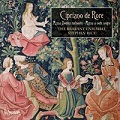 We
quite often hear madrigals by Cipriano de Rore, of which he wrote over
one hundred as well as other secular music, so it is good to hear these
rarities from his sacred output. Whereas de Rore’s madrigals are
important works preparing the way for the revolutions of Monteverdi,
the sacred music seems rather more conventional, harking back to Josquin.
There are five extant masses by de Rore, and the first of the two recorded
here is Missa Doulce mémoire. Right at the start we are
treated to beautiful, smooth lines of flowing melody in the Kyrie and Christe, mostly homophonic in style. The texture varies from
three to six parts, with the addition of a baritone in the second part
of the Agnus Dei. The balance between the parts is always carefully
judged and the dynamics and phrasing meticulously prepared.
We
quite often hear madrigals by Cipriano de Rore, of which he wrote over
one hundred as well as other secular music, so it is good to hear these
rarities from his sacred output. Whereas de Rore’s madrigals are
important works preparing the way for the revolutions of Monteverdi,
the sacred music seems rather more conventional, harking back to Josquin.
There are five extant masses by de Rore, and the first of the two recorded
here is Missa Doulce mémoire. Right at the start we are
treated to beautiful, smooth lines of flowing melody in the Kyrie and Christe, mostly homophonic in style. The texture varies from
three to six parts, with the addition of a baritone in the second part
of the Agnus Dei. The balance between the parts is always carefully
judged and the dynamics and phrasing meticulously prepared.
For me, the most moving piece in this collection is the motet Fratres:
Scitote with text by St Paul from Corinthians describing the instigation
of Holy Communion. Musically speaking the words are depicted with a
judicious mix of counterpoint and homophonic, chordal style in ever-varying
textures. This is all very beautifully performed by the Brabant Ensemble.
For example, the singers achieve a new and different colour in the chordal
section at hoc est corpus meum (this is my body). After the devotional
tone of this moment we return to imitative style as the music builds
in a crescendo and eventually dies away to a whisper at the end.
Rore composed over eighty motets and the first of the three on this
recording is O altitudo divitiarum which also sets words by St
Paul as he describes the unfathomable wisdom of God. This is slow-moving
and devotional music with constantly changing textures, and the voices
are largely presented in imitative style with many suspensions. The
performers capture well the devotional spirit and mood encapsulated
in St Paul’s words.
The final work presented is another Mass, Missa a note negre,
a piece perhaps in a more conservative and conventionally imitative
style, but very attractively performed here. Stephen Rice and his singers
maintain interest throughout. In the Credo for example, they
make effective and dramatic contrasts in moods at Et incarnatus est and in the ensuing exultant Et resurrexit. Later on I like the
light, bouncy performance of Osanna in excelsis and finally the
devotional feel of the Agnus Dei.
This is a very fine collection of unfamiliar sacred music by de Rore.
It is superbly performed, demonstrating a thorough and detailed understanding
of the texts together with excellent balance between the voice parts.
The intonation is always perfect. The Brabant Ensemble directed by Stephen
Rice have added another fine recording to their output. The collection
is very well recorded and it has a warm ambience.
Geoffrey Molyneux
The Phoenix Rising: The Carnegie UK Trust and the revival of Tudor
church music
William BYRD (c. 1540-1623) Ave verum corpus [4:08]
Thomas TALLIS (c. 1505-1585) Salvator mundi (I) [3:20]
William BYRD Mass for five voices:
Kyrie eleison [1:36]
Gloria in excelsis Deo [5:29]
Thomas MORLEY (1557-1602) Nolo mortem peccatoris [3:13]
Orlando GIBBONS (1583-1625) O clap your hands together [5:34]
William BYRD Mass for five voices: Credo [9:55]
Robert WHITE (c. 1538-1574) Portio mea [6:53]
Christe qui lux es et dies (IV) [6:23]
Orlando GIBBONS Almighty and everlasting God [2:17]
William BYRD Mass for five voices: Sanctus and Benedictus [4:30]
Thomas TALLIS In ieiunio et fletu [4:38]
William BYRD Mass for five voices: Agnus Dei [3:46]
John TAVERNER (c. 1490-1545) O splendor gloriæ [12:53]
Stile Antico – rec. November 2012. DDD/DSD
Pdf booklet with texts and translation included
HARMONIA MUNDI HMU807572 [74:24] – from eclassical.com (mp3, 16– and 24-bit lossless)
[See review – Recording of the Month – by John Quinn.]
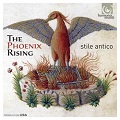 There
are recordings of Byrd’s Masses set within a liturgical concept
and others where all three Masses are performed ‘straight’
without interpolations, but this disc represents a new concept, interspersing
the sections of the five-part setting with other music by Byrd’s
predecessors, contemporaries and successors.
There
are recordings of Byrd’s Masses set within a liturgical concept
and others where all three Masses are performed ‘straight’
without interpolations, but this disc represents a new concept, interspersing
the sections of the five-part setting with other music by Byrd’s
predecessors, contemporaries and successors.
The earliest music, oddly, comes last, illustrating the rather more
florid style of Tallis’s and Byrd’s predecessors in setting
the Latin rite. The remarkable thing is that Taverner was already moving
towards a plainer style and later composers such as Morley and Gibbons
retained the older style in English settings. The programme thus demonstrates
the essentially organic development of this music of the period despite
all the religious upheavals as well as highlighting the work of the
Carnegie Trust is making this wonderful repertoire available. Morley’s Nolo mortem is particularly interesting in setting first the
Latin text then an English ‘commentary’.
I may slightly prefer individual performances of the Byrd Mass and the
other items but it’s pointless to list them because the new Harmonia
Mundi release hangs together as a unique programme. I had considered
making this Recording of the Month but John Quinn has
forestalled me.
As usual, I listened to the 24-bit lossless and the mp3 – it’s
possible to have both for the price of the 24-bit – and both sound
very good, so those wishing to economise with the 16-bit lossless should
not be disappointed.
This is the latest in a series of fine recordings which Stile Antico
have made for Harmonia Mundi:
• HMU807463: TALLIS and BYRD Heavenly Harmonies: Recording of the Month – review
• HMU807509: SHEPPARD (c.1515-1558) Media Vita : see April
2010 DL Roundup– download from eclassical.com (mp3 and lossless, with booklet) or emusic.com (mp3)*
• HMU807419 (SACD)/907419 (CD): TALLIS and BYRD Music for Compline – See review of Calliope CAL9623 – July
2012/2 DL Roundup.
• HMU807559: CORNYSH, GIBBONS, TALLIS,
etc. Passion and Resurrection: Recording of the Month – review and DL
News 2013/4
• HMU807517: BYRD, SHEPPARD, TALLIS, TAVERNER and WHYTE Puer natus est – review
• HMU807489: PALESTRINA, GOMBERT, LASSUS, VICTORIA.: Song of Songs – see review of Linn CKD174, October
2009 DL Roundup
• HMU807554: Tune the Musicke to thy Hart: Tudor
and Jacobean music for private devotion – review and June
2012/2 DL Roundup
* The emusic.com download costs a mere £2.94 but comes at a less
than ideal bit-rate and without the booklet.
Marc-Antoine CHARPENTIER (1643-1704)
Miserere des Jésuites H193-193a [25:09]
Antienne H526 [2:37]
Annunciate superi H333 [10:36]
Overture H536 [5:30]
Litanies de la Vierge, H83 [16:32]
Ensemble Correspondances/Sébastien Daucé – rec. January
2013. DDD.
Pdf booklet with texts and translations included.
HARMONIA MUNDI HMC902169 [60:24] – from eclassical.com (mp3, 16– and 24-bit lossless)
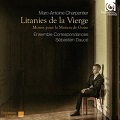 Harmonia
Mundi already had a much more than serviceable account of the Litanies which form the title work of this new release, a recording by Les Arts
Florissants and William Christie, recently reissued at mid price (HMG501298,
also HMX2908510/19, 10 CDs at budget price) and there’s
a recommendable budget-price recording from Hervé Niquet and
Le Concert Spirituel (Naxos 8.553173) so their inclusion in pride
of place on this new release is a work of supererogation but nevertheless
very welcome.
Harmonia
Mundi already had a much more than serviceable account of the Litanies which form the title work of this new release, a recording by Les Arts
Florissants and William Christie, recently reissued at mid price (HMG501298,
also HMX2908510/19, 10 CDs at budget price) and there’s
a recommendable budget-price recording from Hervé Niquet and
Le Concert Spirituel (Naxos 8.553173) so their inclusion in pride
of place on this new release is a work of supererogation but nevertheless
very welcome.
The Miserere, H219, also receives a recommendable performance
from La Chapelle Royale and Philippe Herreweghe on another Harmonia
Mundi recording (HMA1951185); that, too, can be downloaded in
mp3 and lossless from eclassical.com but, at $10.78, it’s more
expensive than the CD, which can be found online for around £6,
and even classicsonline.com’s £5.99 (mp3) represents very
little saving.
Sébastien Daucé and his ensemble have been around for
only a few years but have already established a reputation with their
recordings for Zig Zag. Transferring now to Harmonia Mundi, they offer,
in addition to the Litanies, the less well-known six-part motets
written for the House of Guise, headed by the Miserere –
a setting so sumptuous you’d hardly recognise the penitential nature
of the words. The sumptuous performance which it receives sets the tone
for a very fine new recording. Only the rather dull cover detracts.
The initial offer of 24-bit sound for the same price as mp3 and 16-bit
lossless will have ended by the time that you read this but I also tried
the mp3; it’s very good of its kind, so the hard-up need not have
too many worries about the quality of the 16-bit version. If you don’t
like the plush religious music of this period, this is not for you,
but I’d certainly like to hear more Charpentier from this group.
It’s the wrong time of year for Charpentier’s Leçons
de ténèbres for Holy Week but the performance by Il
Seminario Musicale and Gérard Lesne on a budget Virgin twofer
also deserves strong approval – review:
downloading for £6.99 will save you little if anything on the
CD target price of around £7.50.
Bargain of the Month
 Agostino
STEFFANI (1654-1728) Stabat Mater (1727)
Agostino
STEFFANI (1654-1728) Stabat Mater (1727)
Beatus Vir [5:15]
Non plus me ligate [6:21]
Triduanas a Domino [2:50]
Laudate Pueri [9:35]
Sperate in Deo [12:56]
Qui diligit Mariam [10:02]
Cecilia Bartoli, Nuria Rial, Yetzabel Arias Fernandez, Franco Fagioli,
Julian Prégardien, Daniel Behle, Salvo Vitale,
Coro della Radiotelevisione Svizzera
I Barocchisti/Diego Fasolis
No texts.
All world premieres except Stabat Mater.
DECCA 4785336 [72:01] – from amazon.co.uk (mp3)
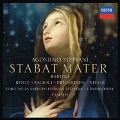 Steffani
made the reverse of the more well-trodden journey that Handel was to
make a few years later – in his case from Italy to Germany. Based
in Munich, he nevertheless seems to have composed the Stabat mater in Protestant Hanover for the benefit of the London Academy of Ancient
Music. It’s a striking work which has received far less attention
than its due, certainly less than Pergolesi’s setting.
Steffani
made the reverse of the more well-trodden journey that Handel was to
make a few years later – in his case from Italy to Germany. Based
in Munich, he nevertheless seems to have composed the Stabat mater in Protestant Hanover for the benefit of the London Academy of Ancient
Music. It’s a striking work which has received far less attention
than its due, certainly less than Pergolesi’s setting.
At £1.59 the Amazon download of the new Decca recording is a real
bargain, even though it comes without texts – who’s complaining
at that price, especially when the text of the Stabat mater is not hard
to obtain, though those of the other works are. In fact, Amazon do offer
a version with digital booklet, but that costs £8.49. The performance
of the main work is impassioned and dramatic; for the many fans of Cecilia
Bartoli it’s almost mandatory but others may prefer the less impassioned,
though equally devotional recording made by The Sixteen and Harry Christophers
and coupled with a fine performance of Handel’s Dixit Dominus on Coro COR16076. Try that recording from Naxos Music Library
if you can, where it comes complete with booklet.
If you already have a good performance of the Handel, the new Decca
offers six works new to the catalogue and although I thought the performances
of these and Stabat mater a little too theatrical at first, I very much
warmed to them the second time around. Potentially this is a release
to rival in importance another Decca release – Robert Hollingworth’s
CD of Striggio of a couple of years ago (4782734). Next stop,
perhaps, more of Cecilia Bartoli’s recent productive diggings into
Steffani’s music: Mission (Decca 4784732 – review)
and/or:
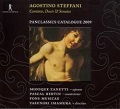
•Agostino STEFFANI (1654-1728) Cantatas, Duets and Sonatas:
Monique Zanetti (soprano); Pascal Bertin (counter-tenor); Fons Musicæ/Yasunori
Imamura. PAN CLASSICS PC10131 [73:37] – from eclassical.com (mp3 and lossless, no booklet) or stream from Naxos Music Library.
Secular cantatas of the type which Handel later composed in Italy and
instrumental music, presenting a lighter side of Steffani’s music.
The more intimate manner of the music and the stylish approach make
a welcome contrast with the Decca recording but the lack of texts –
the Naxos Classical Library offers no help here – is a problem.
I Viaggi Di Faustina: Faustina Bordoni’s journeys to
Naples
Nicola PORPORA Son prigioniera, Raggio amico di speranza (Poro)
Sinfonia (Agrippina)
Leonardo VINCI Scendi da questo soglio, Un guardo solo ancor (Il Trionfo di Camilla) Confusa, smarrita, Non ti minaccio
sdegno (Catone in Utica)
Ecco mi parto (Parto ma con qual core)
Francesco MANCINI Canta e dì caro usignolo, Sinfonia,
Spera sì, mio caro bene (Traiano)
Domenico SARRO Tortora che il suo bene (Partenope)
Concerto per flauto e archi
Antonio Maria BONONCINI Lasciami un sol momento (Rosiclea
in Dania)
Roberta Invernizzi (soprano)
I Turchini/Antonio Florio
Pdf booklet with texts and translations included
GLOSSA GCD922606 [63:50] – from eclassical.com (mp3 and lossless)
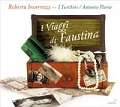 Good
news for lovers of fine baroque music superbly sung: this is superlative
in every respect. Even better news: it’s billed as the first of
a series focusing on famous Italian singers from the 17th and 18th centuries,
whose travels (viaggi) bear witness to the intense level of artistic
activity then taking place in the major cities of Europe. I don’t
know what Faustina Bordoni, who inspired this recording, sounded like
– pretty good, by all accounts – but I imagine that Roberta
Invernizzi, who already had a fine Glossa recording of Vivaldi and several
for Opus 111/Naïve and Virgin to her credit, could have given her
a very fair run for her money. The availability of the booklet and the
recording quality – good in mp3, even better in lossless flac –
are additional good news.
Good
news for lovers of fine baroque music superbly sung: this is superlative
in every respect. Even better news: it’s billed as the first of
a series focusing on famous Italian singers from the 17th and 18th centuries,
whose travels (viaggi) bear witness to the intense level of artistic
activity then taking place in the major cities of Europe. I don’t
know what Faustina Bordoni, who inspired this recording, sounded like
– pretty good, by all accounts – but I imagine that Roberta
Invernizzi, who already had a fine Glossa recording of Vivaldi and several
for Opus 111/Naïve and Virgin to her credit, could have given her
a very fair run for her money. The availability of the booklet and the
recording quality – good in mp3, even better in lossless flac –
are additional good news.
Antonio VIVALDI (1678-1741)
Suonate a solo facto per M. Pisendell (Dresden Violin Sonatas)
Violin sonata in G, RV25 [10:22]
Violin sonata in c minor, RV6 [12:05]
Violin sonata in F, RV19 [17:38]
Violin sonata in C, RV2 [15:57]
Violin sonata in A, RV29 [6:25]
Baltic Baroque – rec. venues and dates not provided with download
ESTONIAN RECORD PRODUCTIONS ERP6312 [62:27] – from eclassical.com (mp3 and lossless) or stream from Naxos Music Library
 Brian
Reinhart reviewed this in the last DL News from the classicsonline.com
download and was somewhat disappointed. It’s also available from
eclassical.com in mp3 and lossless for $11.27, which is competitive
with the classicsonline.com price for mp3 only. There’s no booklet
but there’s none with the classicsonline.com download either, only
a rear cover which doesn’t open correctly.
Brian
Reinhart reviewed this in the last DL News from the classicsonline.com
download and was somewhat disappointed. It’s also available from
eclassical.com in mp3 and lossless for $11.27, which is competitive
with the classicsonline.com price for mp3 only. There’s no booklet
but there’s none with the classicsonline.com download either, only
a rear cover which doesn’t open correctly.
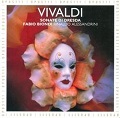
I was rather more enamoured of the music than BR, though it’s not
his most inspired repertoire and this is hardly the most urgent Vivaldi
recommendation. You may find yourself in a happier hunting ground with
another selection of these sonatas composed for the virtuoso Pisendell
in Dresden:
• Sonatas RV26, 34, 5, 15, 28 and Saraband in C, so no overlaps
with the Estonian selection, in lively but not over-lively performances
by Fabio Biondi (violin), Maurizio Naddeo (cello) and Rinaldo Alessandrini
(harpsichord) (Naïve/Opus11 OP30154 – rec. c.1996),
well recorded in mp3 and lossless from eclassical.com.
Baroque Recorder Concertos
Antonio VIVALDI (1678-1741) Flautino Concerto in G, RV443 [10:29]
Georg Philipp TELEMANN (1681-1767) Overture (Suite) TWV55a2 in
a minor for recorder (flute), strings and continuo [26:24]
Giuseppe SAMMARTINI (1695-1750) Concerto in F [12:08]
Antonio VIVALDI Recorder Concerto in c minor, RV441 [10:31]
Recorder Concerto in C, RV444 [9:08]
Pamela Thorby (recorder)
Sonnerie/Monica Huggett – rec. 2001. DDD/DSD
Pdf booklet included
LINN CKD217 [68:50] – from linnrecords.com (SACD, mp3 and lossless)
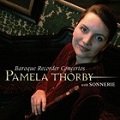 Though
by no means of recent provenance, this is one of Pamela Thorby’s
recordings that I had missed. Though there are several other recommendable
recordings of the Telemann Suite in particular – I haven’t
counted but I think it may be his most often recorded work – this
is a very valuable collection, more varied than you might imagine, very
well performed – almost a given when you look at the personnel
involved – and recorded. There’s no 24-bit version, so fans
of the highest fi will have to turn to the SACD, but I have no complaint
at all concerning the 16-bit flac.
Though
by no means of recent provenance, this is one of Pamela Thorby’s
recordings that I had missed. Though there are several other recommendable
recordings of the Telemann Suite in particular – I haven’t
counted but I think it may be his most often recorded work – this
is a very valuable collection, more varied than you might imagine, very
well performed – almost a given when you look at the personnel
involved – and recorded. There’s no 24-bit version, so fans
of the highest fi will have to turn to the SACD, but I have no complaint
at all concerning the 16-bit flac.
If you missed the other recordings of Pamela Thorby on Linn, they include:
• CKD291: Garden of Early Delights – review and January
2009 Download Roundup
• CKD341: The Nightingale and the Butterfly – review and July 2010 Download Roundup
• CKD223: HANDEL Recorder Sonatas
All except CKD217 can be sampled from Naxos Music Library.
For the new Linn recording of the Brandenburgs, to which she
contributes, see below.
Jean-Philippe RAMEAU (1683-1764)
Zoroastre (1756 version)
Zoroastre, founder of the Magi – Mark Padmore (haute-contre)
Abramane, high priest of Ariman – Nathan Berg (tenor)
Amélite, heiress to the throne of Bactria – Gaelle Mechaly
(soprano)
Erinice, princess of the blood of the Kings of Bactria – Anna-Maria
Panzarella (soprano)
Zopire, priest of Ariman; La Vengeance – Matthieu Lecroart (bass)
Narbanor, priest of Ariman – Francois Bazola (bass)
Oromasès, King of the Genies; Ariman – Eric Martin Bonnet
(bass)
Céphie, Bactrian girl – Stephanie Revidat (soprano)
Les Arts Florissants/William Christie – rec. live 2001. DDD.
Supplement includes dances omitted from live performance plus 1749 ending
of Act V.
WARNER CLASSICS 2564658889 [3CDs: 2:42:39] – from sainsburysentertainment.co.uk (mp3)
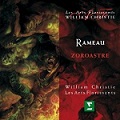 I
can be fairly brief in welcoming the return of this old friend, a well-established
classic, now at mid-price, especially as I’ve written a fuller
review of the CD set, due to appear on the main MusicWeb International
pages (target price on disc around £17.50 in the UK or £9.99
in 320kb/s mp3 from sainsburysentertainment.co.uk).
The CD booklet doesn’t contain the libretto, only a synopsis which
you should be able to find online, so there’s every reason to save
by going for the download. Robert Hugill welcomed the earlier release
of this recording in terms which I can only endorse and urge you to
read – review.
The music, singing and above all William Christie’s direction of
Les Arts Florissants make for a most enjoyable experience.
I
can be fairly brief in welcoming the return of this old friend, a well-established
classic, now at mid-price, especially as I’ve written a fuller
review of the CD set, due to appear on the main MusicWeb International
pages (target price on disc around £17.50 in the UK or £9.99
in 320kb/s mp3 from sainsburysentertainment.co.uk).
The CD booklet doesn’t contain the libretto, only a synopsis which
you should be able to find online, so there’s every reason to save
by going for the download. Robert Hugill welcomed the earlier release
of this recording in terms which I can only endorse and urge you to
read – review.
The music, singing and above all William Christie’s direction of
Les Arts Florissants make for a most enjoyable experience.
Should you have any doubts and have access to the invaluable Naxos Music
Library, you can try Zoroastre there, apart from the appendix
to CD 3 containing the dances omitted from the live performance and
the original 1749 ending of Act V. Don’t, however, judge the recording
quality from the streamed version; as heard on CD the sound is very
good and the Sainsburys mp3, though I haven’t heard it, is likely
to be not far behind.
A Strong Contender
 Johann
Sebastian BACH (1685-1750)
Johann
Sebastian BACH (1685-1750)
Brandenburg Concertos 1-6 [93:00]
Dunedin Consort/John Butt – rec. May 2012. DDD/DSD
Pdf booklet included
LINN CKD430 [2 CDs: 93:00] – from linnrecords.com (SACD, mp3, 16– and 24-bit lossless)
 John
Butt, the Dunedin Consort and Linn have another winner on their hands;
not only are performances and recording first-rate, with period horns
much more tolerable than most, but the SACDs and downloads are offered
as two for the price of one. I’ve already praised John Butt and
his team in the two Bach Passions and b-minor Mass, but the new release
proves equally desirable. What a long way we have come from the days
when we thought Karl Münchinger the last word in the Brandenburgs;
now we even have several really good period-instrument versions to choose
from and this is by no means the least among them.
John
Butt, the Dunedin Consort and Linn have another winner on their hands;
not only are performances and recording first-rate, with period horns
much more tolerable than most, but the SACDs and downloads are offered
as two for the price of one. I’ve already praised John Butt and
his team in the two Bach Passions and b-minor Mass, but the new release
proves equally desirable. What a long way we have come from the days
when we thought Karl Münchinger the last word in the Brandenburgs;
now we even have several really good period-instrument versions to choose
from and this is by no means the least among them.
Some musicological detective work on period practice has been involved,
as explained in the notes, which are included with the download –
scholarly but not solely aimed at specialists. The differences from
other recordings are less marked than in the case of the recent St
John Passion, strikingly set within the context of Lutheran Vespers,
and they are certainly not of the obtrusive slap in the face variety.
Nothing to frighten the horses, then, but certainly not a bland interpretation,
either. I suspect that this may well become one of the versions to which
I turn most frequently in future. I’m not, however, sure how appropriate
the cover is.
George Frideric HANDEL (1685-1759)
Chandos Anthem No.8, O come let us sing unto the Lord, HWV253 [30:58]
Chandos Anthem No.6a, As pants the hart, HWV251b [20:00]
Chandos Anthem No.5a, I will magnify Thee, O God, HWV250a [23:55]
Susan Gritton (soprano); Iestyn Davies (counter-tenor); Thomas Hobbs
(tenor)
The Choir of Trinity College Cambridge
Orchestra of the Age Enlightenment/Stephen Layton – rec. July 2012.
DDD.
Pdf booklet with texts included
HYPERION CDA67926 [74:48] – from hyperion-records.co.uk (mp3 16– and 24-bit lossless)
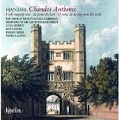 Excellent
quality of sound, judicious balancing in the orchestra and clarity of
texture are immediately apparent in the opening sonata of the first
of the three anthems recorded here, O come, let us sing unto the
Lord. In fact these are qualities which characterise all the performances
here. The first chorus is fast and lively with very clear diction. Each
consonant seems to urge the music forward and onward, and there is always
spirited accompaniment from the orchestra. Thomas Hobbs’ voice
seems totally appropriate in his aria, O come, let us worship and
fall down. His sustained tone is really beautiful and his voice
is a great pleasure. Hobbs’ phrasing and expression are also well
conceived. However Susan Gritton has too much vibrato for my taste in
her aria O magnify the Lord and I am not too keen on her sound
generally, particularly on some long notes in certain registers. However
there is some very attractive singing from the counter tenor, Iestyn
Davies in The Lord preserveth. Great rhythmic precision and vitality
is demonstrated in the final chorus, and every word can be heard even
at the helter-skelter tempo adopted here.
Excellent
quality of sound, judicious balancing in the orchestra and clarity of
texture are immediately apparent in the opening sonata of the first
of the three anthems recorded here, O come, let us sing unto the
Lord. In fact these are qualities which characterise all the performances
here. The first chorus is fast and lively with very clear diction. Each
consonant seems to urge the music forward and onward, and there is always
spirited accompaniment from the orchestra. Thomas Hobbs’ voice
seems totally appropriate in his aria, O come, let us worship and
fall down. His sustained tone is really beautiful and his voice
is a great pleasure. Hobbs’ phrasing and expression are also well
conceived. However Susan Gritton has too much vibrato for my taste in
her aria O magnify the Lord and I am not too keen on her sound
generally, particularly on some long notes in certain registers. However
there is some very attractive singing from the counter tenor, Iestyn
Davies in The Lord preserveth. Great rhythmic precision and vitality
is demonstrated in the final chorus, and every word can be heard even
at the helter-skelter tempo adopted here.
The sonata which begins As pants the heart for cooling streams includes some well-played and virtuosic violin music, but the singers
soon set a different tone in their first chorus. This is my favourite
piece in this collection and so I am happy it is performed so well.
It is melancholic and reflective, a very different mood now admirably
captured by Stephen Layton and his forces. I like Susan Gritton much
better in some parts of her range in her aria Tears are my daily
food. She phrases and shapes her melodic lines beautifully, but
why do some notes have more vibrato than others? Better to have no vibrato
at all. Again Thomas Hobbs is magnificent in Now when I think thereupon,
though admittedly there is some vibrato here too.
The Chorus I will magnify thee O God, my King in Chandos Anthem
No.5 really dances along. Ev’ry day I will give thanks unto
thee is again beautifully sung by Thomas Hobbs. He gives the beautiful
aria The Lord preserveth all them that love him a refined legato
phrasing. Then there is a dramatic contrast when he really attacks but
scattereth abroad all the ungodly. He copes superbly with the florid
writing on blessed in the penultimate number, with every note
clear and perfectly in tune.
This is a very enjoyable and refreshing collection, superbly performed,
and the recording quality, as always with Hyperion, is excellent.
Geoffrey Molyneux
It’s been some time since we had the predecessor to this recording
from these forces, though with the AAM instead of the OAE and Emma Kirkby
as an even more enticing soprano soloist: Chandos Anthems 7, 9 and 11a
on CDA67737 – review – but worth the wait. If, as I assume they will, Hyperion complete
the set, it will offer a lighter, more free-wheeling alternative to
the Chandos recordings: CHAN0554, 4 CDs, also available separately, CHAN0503-6.
At present the Chandos individual downloads are in mp3 only – I’m
not sure why; my archived copy of CHAN0503 is in lossless sound
– and though the box set appears to offer mp3 and lossless, it
won’t allow me to purchase the latter. The performances are very
good – The Sixteen and Harry Christophers practically guarantee
that – but there is one major respect in which I prefer the Hyperion:
I don’t warm to Ian Partridge’s voice which opens the proceedings
on the very first anthem in the box. That’s a purely personal response,
which you may very well not share and it isn’t fatal even for me
when the performances are so good; try the samples from theclassicalshop.net or, better still, if you can, from Naxos Music Library.
The recording sounds fine, even in mp3 and the booklet, with texts,
is available to all-comers. As it’s mp3 only for the moment, I
should point out that 7digital.com offer the whole set for just £7.49 – no booklet, but that’s
freely available from the Chandos site.
Some other Handel recommendations, mainly vocal – not precluding
a more detailed review in a future DL News where I haven’t given
a link:
• BIS BIS-SACD-2027: Water Music; Occasional Oratorio Overture
– Haydn Sinfonietta, Wien/Manfred Huss – from eclassical.com (mp3, 16– and 24-bit lossless). Distinguished
playing on this new recording but, unless you must have 24-bit sound,
the King’s Consort on budget-price Hyperion Helios CDH55375 (from hyperion-records.co.uk,
mp3 and lossless – see April 2012/1 DL Roundup) and Trevor Pinnock
(DG Archiv, 2 CDs – from 7digital.com,
mp3 only) are both a little lighter on their feet, couple the Water
Music with the Fireworks Music and offer better value. The
DG recording, on 2 CDs, also adds several other orchestral works; see April
2009 for review of earlier single-CD release and comparison with
Hervé Niquet on Glossa.
• Beulah 1-3BX69: Water Music – Philomusica/Thurston
Dart. A stylish and inexpensive reminder that Dart was a leading light
in the rediscovery of authentic performance, well worth having alongside
more recent recordings or even in its own right: see December
2010 DL Roundup.
• Hyperion Helios CDH55075: Concerti Grossi, Op.3/1-6 –
Brandenburg Consort/Roy Goodman – review:
download from hyperion-records.co.uk (mp3 and lossless, with booklet)
• Linn CKD362 (3 CDs): Concerti Grossi, Op.6/1-12 –
Avison Ensemble/Pavlo Besnosiuk. Download of the Month, July
2010 Roundup. There’s no need to look for alternatives, but
I still also listen with enjoyment to Christopher Hogwood (Avie, with
Op.3) which I own in its earlier Decca incarnation, and Arte dei Suonatori/Martin
Gester (BIS-CD-1705/6 – September
2011/2 Roundup).
• DG 4630942: Water Music, Fireworks Music, Op.3 and Op.6
Concerti Grossi, etc. – English Concert/Trevor Pinnock: this 6-CD
budget box can still give the later recordings which I’ve listed
a good run for their money. Mp3 or lossless from deutschegrammophon.com. See April
2010. For other recordings of the Water Music and Fireworks Music,
see June
2012/2.
• Harmonia Mundi 807466: Organ Concertos, Op.4/1-6 –
Academy of Ancient Music/Richard Egarr (organ) – from eclassical.com (mp3 and lossless). These are less demonstrative performances than most
of the rival versions, but very satisfying and just (but only just)
pipping the similar chamber-scale performances on Avie at the post.
Alternatively, for a selection from Op.4 and Op.7 plus The Cuckoo
and the Nightingale, Simon Preston and Trevor Pinnock, DG E4473002,
see April
2009. 7digital.com also have their complete 3-CD set. Ton Koopman’s excellent set
of Op.4 and Op.7 is best purchased on CD (Warner Apex 2564627602,
2 discs, around £7).
• Beulah 22BX69: Organ Music – Thurston Dart. See 2013/9
DL News.
• Harmonia Mundi 807857 (35683115): Dixit Dominus (with
VIVALDI Dixit Dominus) – La Nuova Musica – see 2013/8
DL News.
• BIS-CD-1235: Dixit Dominus; Gloria in excelsis Deo – Emma Kirkby (soprano); Drottningholm Baroque Ensemble/Andres
Öhrwall – see 2013/8
DL News.
• BIS-CD-1615 Neun deutsche Arien; Gloria –
Emma Kirkby’s second stab at the Gloria is just as desirable
– see 2013/8
DL News.
• BIS-SACD-1695: Handel in Italy – Emma Kirkby
– see 2013/8
DL News.
• Glossa Portrait GCDP10002: Handel in Italy –
Roberta Invernizzi and Emanuela Galli (soprano), Romina Basso (mezzo)
and la Risonanza/Fabia Bonizzoni – rec. 2005-2009. Download in
mp3 and lossless from eclassical.com.
Slightly confusingly, this is another recording with the same title
as the BIS/Kirkby and equally desirable, apart from the fact that it
comes without booklet. This 2-CD set brings together two hours of Italian
cantatas from GCD921521-4, a series which I praised highly in March
2009 and three further volumes which have appeared since then, all
of which remain available separately from classicsonline.com. Delectable
music, delectably sung, whether you choose BIS or Glossa – preferably
both, despite the inevitable overlaps. Another Glossa Handel recording
to consider:
• Glossa Cabinet GCD80001: Trio Sonatas Op.2/2 and 3; Recorder
Sonatas Op.1/4 and 11; Violin Sonatas, HWV346b and Op.1/14 – Arcadia
Ensemble and Arcadia Trio, rec. 1992. Download in mp3 and lossless from eclassical.com.
An attractive introduction to Handel’s chamber music, though you’ll
find better performances of individual works in other collections such
as The Trio Sonata in 18th-century England (BIS-CD-1765 – review:
download from eclassical.com,
mp3, 16– and 24-bit lossless, with booklet) or the complete Op.2
Trio Sonatas (Sonnerie, Avie AV0033: Recording of the Month – review and February
2011 Roundup) or the near-complete set on Hyperion Helios CDH55280 at budget price (Convivium – review)
or London Handel Players’ recording for Somm of the Op.5 Trio Sonatas
(CD044 – review).
Pamela Thorby’s excellent recording the Handel recorder sonatas
is on Linn CKD223. The Glossa has a very attractive cover but
there’s no booklet. The CD is released at less than full price
but the eclassical.com price of $10.13 is still very competitive.
• BIS-SACD-1436: Great Oratorio Duets – Robin Blaze,
Carolyn Sampson; Orchestra of the Age of Enlightenment/Nicholas Kraemer.
From eclassical.com (mp3 16– and 24-bit lossless, with booklet). I’m not sure
about the ‘great’ but the music, singing, accompaniment and
recording are too good to care.
• Decca 4758746: Arias – Danielle de Niese (soprano);
les Arts Florissants/William Christie – see November
2009 for this and several other Handel recommendations.
• DG 4776547: Arias: Ah! Mio cor – Magdalena
Kožená (soprano); Venice Baroque/Andrea Marcon
• DG First Choice 4779965: Arias – Bryn Terfel (bass-baritone);
Scottish Chamber Orchestra/Charles Mackerras. Now reissued at mid-price;
be careful to choose the version at £5.49 from 7digital.com (mp3) – they also have the same recording for £7.49. Excerpts
from this and the Kožená recording on Handel Gold – review.
• Decca 4756569: Arias for Senesino – Andreas Scholl
(counter-tenor); Accademia Dantone/Ottavio Dantone – review and January
2010 DL Roundup: download now not from passionato.com but from 7digital.com (mp3). Two other Andreas Scholl recordings, this time from Harmonia
Mundi, are reviewed in November
2009.
• Harmonia Mundi 3955183: Arias for Senesino – Drew
Minter (counter-tenor); Philharmonia Baroque/Nicholas McGegan –
from eclassical.com (mp3 and lossless, no booklet). CD now available
only as part of 4-disc set.
• Harmonia Mundi 902077 (31009884): Ombra cara – arias
mainly for Senesino – Bejun Mehta (counter-tenor); Freiburg Baroque
Orchestra/René Jacobs. See 2013/3
DL News
• Hyperion Helios CDH55370: Heroic Arias – James Bowman
(counter-tenor); King’s Consort. See July
2012/2 DL Roundup.
• Aparté AP048: Handel Bad Guys – Xavier Sabata
(counter-tenor); il Pomo d’Oro/Minasi – review and 2013/10
DL News.
Some related strong choices from the Palladian Ensemble, all available
in mp3 and lossless from linnrecords.com:
• CKD982: The complete Palladian Ensemble collectors’
series, comprising all the albums listed below, which are also available
as 2-CD pairs:
• CKD010: An Excess of Pleasure
• CKD015: The Winged Lion – music from Venice
• CKD036: JS BACH Trio Sonatas
• CKD275: JS BACH Sonatas and Chorales
• CKD100: The Sun King’s Palace – music
by COUPERIN, MARAIS and RÉBEL from Versailles
• CKD221: MARAIS and RÉBELLes Elémens
• CKD041: A Choice Collection – music of Purcell’s
London
• CKD126: MATTEIS, etc Held by the Ears
Also from the Palladians, but not in the complete collection:
• CKD292: TARTINI and VERACINI The Devil’s Trill – from linnrecords.com.
• CKD050: Trios for Four: HANDEL Trio Sonatas, Op.2/1
and 4; Telemann Sonatas in g minor and a minor; Leclair Ouverture in
G, Op.13/1; Quantz Sonata in C – from linnrecords.com
Wolfgang Amadeus MOZART (1756-91)
Piano Concerto No.20 in d minor, K466 [26:14]
Piano Concerto No.27 in B flat, K595 [26:35]
Ronald Brautigam (fortepiano)
Die Kölner Akademie/Michael Alexander Willens
Rec. Deutschlandfunk Kammermusiksaal, July 2012. DDD/DSD
Pdf booklet included
Fortepiano by Paul McNulty 2011, after an instrument by Walter &
Sohn, c.1802
BIS-SACD-2014 [53:34] – from eclassical.com (mp3, 16– and 24-bit lossless)
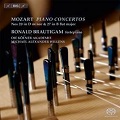 This
is the latest release in a series of recordings of the Mozart piano
concertos which has received a good deal of stick in certain quarters,
quite unjustified in my opinion, relating to the impact of soloist and
orchestra. It has even led to an acrimonious exchange between Michael
Willens and one reviewer. On the other hand, earlier volumes have not
quite risen in my opinion to the top five-star ratings awarded by some
reviewers.
This
is the latest release in a series of recordings of the Mozart piano
concertos which has received a good deal of stick in certain quarters,
quite unjustified in my opinion, relating to the impact of soloist and
orchestra. It has even led to an acrimonious exchange between Michael
Willens and one reviewer. On the other hand, earlier volumes have not
quite risen in my opinion to the top five-star ratings awarded by some
reviewers.
I’m not a lover of the fortepiano per se, but I did enjoy
this recording and its predecessors precisely because of the quality
of the orchestra and solo instrument which received the opprobrium.
This time the solo instrument is a copy of a different and rather more
mellifluous Walter original from that used in the earlier recordings:
• BIS-SACD-1794: Piano Concertos 9 and 12; Rondo in A – download
review
• BIS-SACD-1894: Piano Concertos 24 and 25 – review and download
review
• BIS-SACD-1944: Piano Concertos 17 and 26 – download review
• BIS-SACD-1964: Piano Concertos 19 and 23 – download
review
BIS-SACD-1964 contains a performance of my favourite among all
these favourites, Piano Concerto No.23, K488, but the new recording
runs it at least a very close second, principally for the fine performance
of Piano Concerto No.20, though that of No.27 also made me warm to that
work as much as any performance that I have heard of it. On second hearing
I’m inclined to rate this volume even higher than its predecessor.
As before, the solo performances are sprightly and stylish with strong
orchestral support. I have thought some of the earlier releases slightly
lacking the last degree of involvement with the music, but that comment
would apply much less in the present instance, with only my very top
recommendations for No.20 rivalling or excelling Brautigam and his team:
• Stephen Kovacevich with the LSO and Colin Davis – currently
unavailable; snap up a copy of the Philips coupling with No.23 if you
can
• Clifford Curzon with the ECO/Benjamin Britten or LSO/István
Kertesz (Nos. 20, 23-24, 26-27, Decca Legends 4684912, 2 CDs,
or coupled as on BIS, Nos. 20 and 27, Decca 4767092, download
only from prestoclassical.co.uk,
or Curzon’s complete Decca recordings, 4784389, 23 CDs)
• Alfred Brendel with the ASMF/Neville Marriner (Nos. 19-21, 23
and 24, Decca Duo 4422692, 2 CDs)
• Mitsuko Uchida with the ECO/Jeffrey Tate (Nos. 19-23, Decca Duo 4685402). See download
review for the Brendel and Uchida, both excellent value on CD or
as downloads.
As for the competition on the fortepiano, I thought Arthur Schoonderwoerd
a little too Dresden-china-ish in No.20: Accent ACC24365 (with
No.21) – see download
review. Brautigam’s performance is snappier and free from comparisons
with delicate porcelain. Otherwise fortepiano-seekers will have to turn
to Malcom Bilson’s complete set with John Eliot Gardiner and his
English Baroque Soloists on DG Archiv: E4631112, 9 CDs for around
£45 or download in 320kb/s mp3 from 7digital.com for £28.99.
Competition is slightly less fierce in No.27, with Clifford Curzon/Benjamin
Britten (see above) and Alfred Brendel/Neville Marriner (Nos. 9, 15,
22, 25 and 27, Decca Duo 4425712 – review)
my top dogs. If you tend to think of this concerto – as I usually
do – as not quite reaching the Elysian heights of Nos. 20-24, Brautigam
could be the man to make you think again. Certainly I thought it far
less easy than usual to maintain that point of view after hearing the
new recording.
The recording is very good in mp3 and excellent in 24-bit format –
on offer for a limited time at the same price as mp3 and 16-bit. The
smallish orchestra and the solo instrument are well balanced so that
the former sounds full-bodied; not large-scale, but by no means pint-sized
or desiccated as described in those notorious reviews, and the soloist
shines without being too forward.
I’ve said that I wouldn’t quite have given earlier volumes
that top 5-star rating, but this is the best of the series so far. Were
we still in the business of awarding stars, I think I might go for four-and-a-half.
54 minutes is a bit mean for a CD these days; if you download from eclassical.com,
their policy of charging per second brings the price down to $8.03 for
the 16-bit and mp3 versions.
Ludwig van BEETHOVEN (1770-1827)
Symphony No.1 in C, Op.21 – rec. 1961. ADD
Berlin Philharmonic Orchestra/André Cluytens
BEULAH EXTRA 24-27BX82 [25:21] – from eavb.co.uk (mp3)
Symphony No.3 in E-flat, Op.55 (Eroica)
Berlin Philharmonic Orchestra/André Cluytens – rec. 1960.
ADD
BEULAH EXTRA 28-31BX82 [47:46] – from eavb.co.uk (mp3)
Overture: The Creatures of Prometheus, Op.43
Berlin Philharmonic Orchestra/André Cluytens – rec. 1961.
ADD
BEULAH EXTRA 32BX82 [5:37] – from eavb.co.uk (mp3)

 We’ve
had Cluytens in Beethoven from Beulah before – Symphony No.2 and
Symphony No.4 (November
2011/1 Roundup), Symphony No.5 (January
2011), Symphony No.6 (February
2011), Symphony No.7 (33-36BX82), Symphony No.8 (37-40BX82)
and Symphony No.9 (December
2010) – performances which have worn very well and are still
well worth considering, perhaps alongside more recent alternatives.
Now they complete his run of the symphonies.
We’ve
had Cluytens in Beethoven from Beulah before – Symphony No.2 and
Symphony No.4 (November
2011/1 Roundup), Symphony No.5 (January
2011), Symphony No.6 (February
2011), Symphony No.7 (33-36BX82), Symphony No.8 (37-40BX82)
and Symphony No.9 (December
2010) – performances which have worn very well and are still
well worth considering, perhaps alongside more recent alternatives.
Now they complete his run of the symphonies.
Among the new releases I particularly enjoyed the First Symphony –
it’s to Beethoven in less grand mode than in the Eroica, Fifth
and Choral symphonies that I turn most often and I like the way that
Cluytens refuses to try to make this work sound more than what it is
– inspired by Mozart and Haydn but with hints of the Beethoven
to come. By the same token I also enjoyed Cluytens’ Seventh and
Eighth, though it’s Colin Davis’s 1961 Seventh with the RPO
that really captures the spirit of that work for me (Beulah 15-16BX129 – February 2012/1).
I think Cluytens may have shared my reservations about Beethoven in
grandiose manner because his Eroica emphasises the music’s
beauty rather than its drama. I see that Edward Greenfield said much
the same when reviewing the CFP LP reissue. That’s not to say that
the performance is flaccid, but among recordings of this vintage I much
prefer Klemperer, especially his mono recording. One huge improvement
over the original LP release and reissues is having the Funeral March
complete without the irritating LP side-turn that we used to have to
make.
The recordings have come up almost as good as new and I didn’t
hear a trace of surface noise. These releases are good value, too –
the First Symphony for £2.50 and the Eroica for £3.50, with
the Overture for £0.50.
Ludwig van BEETHOVEN (1770-1827)
Symphony No. 4 in B-flat, Op.60 [32:55]
Symphony No. 7 in A, Op.92 [39:23]
The Academy of St Martin in the Fields/Joshua Bell
SONY CLASSICAL 88765448812 [72:15] – from sainsburysentertainment.co.uk (320kb/s mp3) or stream from Naxos Music Library
 Having
recently favoured several recordings of Beethoven symphonies –
Basic Repertoire, 2013/11
DL News – I hardly expected a serious rival for these two,
my favourites when I don’t want Beethoven in full pomp. There’s
nothing very special here and that’s why I liked the performances
– good, straight, lively accounts with a small modern-instrument
orchestra long used to performing like period-instrument ensembles.
If for any reason you don’t like Herreweghe (Pentatone PTC186315)
or Boyd (Avie AV2169), both similarly coupled, as I do, this
could be your ideal version.
Having
recently favoured several recordings of Beethoven symphonies –
Basic Repertoire, 2013/11
DL News – I hardly expected a serious rival for these two,
my favourites when I don’t want Beethoven in full pomp. There’s
nothing very special here and that’s why I liked the performances
– good, straight, lively accounts with a small modern-instrument
orchestra long used to performing like period-instrument ensembles.
If for any reason you don’t like Herreweghe (Pentatone PTC186315)
or Boyd (Avie AV2169), both similarly coupled, as I do, this
could be your ideal version.
The recording is a trifle thin as heard from Naxos Music Library at
120kb/s, but that shouldn’t be a problem if you choose the 320kb/s
version to which I’ve given a link. The cover’s a bit garish,
too, but that’s how CBS covers used to look in the pre-Sony days
– they’ve even resurrected the old two-pointed stereo symbol.
Giuseppe VERDI (1813-1901) Otello (1887)
Otello, a Moor, general of the Venetian forces – Aleksandrs Antonenko
(tenor)
Iago, his ensign – Carlo Guelfi (baritone)
Desdemona, wife of Otello – Krassimira Stoyanova (soprano)
Emilia, wife of Iago – Barbara Di Castri (mezzo-soprano)
Cassio, a captain – Juan Francisco Gatell (tenor)
Roderigo, a Venetian gentleman – Michael Spyres (tenor)
Lodovico, ambassador of the Venetian Republic – Eric Owens (bass-baritone)
Montano, Otello’s predecessor as governor of Cyprus – Paolo
Battaglia (bass)
A Herald – David Govertsen (bass)
Chicago Symphony Chorus, Children’s Choir and Symphony Orchestra/Riccardo
Muti – rec. live, April 2011. DDD.
Pdf booklet with texts included
CSO RESOUND CSOR9011301 [66:54 + 69:03] – from eclassical.com (mp3 and lossless)
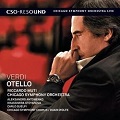 By
omitting Shakespeare’s Act I, Verdi and his librettist Boito not
only brought the action within the single day and place prescribed by
the Aristotelian unities; more to the point he produced a succinct opera
which runs for a little over two hours and concentrates a great deal
of impressive music and powerful emotion within that span. For those
reasons it joins Aïda, Don Carlo(s) and Rigoletto at the top of the tree of my Verdian favourites – a more selective
list than my Wagner favourites, which encompass just about his whole
output.
By
omitting Shakespeare’s Act I, Verdi and his librettist Boito not
only brought the action within the single day and place prescribed by
the Aristotelian unities; more to the point he produced a succinct opera
which runs for a little over two hours and concentrates a great deal
of impressive music and powerful emotion within that span. For those
reasons it joins Aïda, Don Carlo(s) and Rigoletto at the top of the tree of my Verdian favourites – a more selective
list than my Wagner favourites, which encompass just about his whole
output.
This live version from Chicago does the work justice but for some reason
which I cannot understand, the mp3 version sounds brighter, more immediate
and much more impressive on my system than the lossless flac.
Pyotr Il’yich TCHAIKOVSKY (1840-1893)
Swan Lake, Op.20: ballet in four acts (1877)
James Ehnes (violin)
Bergen Philharmonic Orchestra/Neeme Järvi
rec. Grieghallen, Bergen, Norway, 18 June and 3-6 December 2012. DDD/DSD
Pdf booklet available
CHANDOS CHAN5124 [2 CDs: 81:17 + 73:24 = 154:41] – from theclassicalshop.net (mp3 and 16-bit lossless)
[also available as Hybrid SACD CHSA5124]
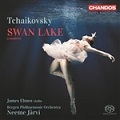 This
is an interim set of thoughts – look out for a more detailed review
in the next DL News or on the main MusicWeb International review page.
This
is an interim set of thoughts – look out for a more detailed review
in the next DL News or on the main MusicWeb International review page.
We weren’t exactly short of elite versions of Swan Lake,
so any new recording has to have a distinctive selling point to compete.
In this case it’s the high-quality recording, available as a hybrid
CHSA and lossless download, though the latter, surprisingly, is not
of the 24-bit variety. Among those recordings which I’ve heard
in various formats the ones to rival or excel would be:
• LSO/André Previn – a strong budget-price release
on an EMI twofer (9676842) or even less expensively as an mp3
download from sainsburysentertainment.co.uk or classicsonline.com,
both at £4.99. The 1976 recording needs hardly any allowance for
its age. See review and download
review of earlier CFP release.
• Minneapolis SO/Antal Doráti – a transcription from
Past Classics, of a 1957 recording which shows its age but sounds tolerable
and enshrines a performance still very well worth hearing – see download
review of this and the Fistoulari on the same label.
• LSO/Anatole Fistoulari – about two thirds of the score recorded
in mono in 1952; a Naxos Classical Archive download in dated but decent
sound.
• Concertgebouw/Anatole Fistoulari (excerpts) – Fistoulari’s
single-LP stereo remake from 1961: Decca Eloquence 4429032: Bargain
of the Month – review.
• Philadelphia Orchestra/Wolfgang Sawallisch, EMI Gemini 5855412,
another very worthwhile budget-price twofer.
• Montréal SO/Charles Dutoit, Decca 4783097, 2 CDs
at mid price.
• Mariinsky Theatre O/Valery Gergiev – not as ‘complete’
as claimed: it’s actually the 3-act performing edition from 1895.
Decca 4757669 – download
review: now available from 7digital.com.
76 minutes of highlights also from 7digital.com.
As with Neeme Järvi’s earlier Chandos recording of Sleeping
Beauty (CHAN5113 – download
review) I absorbed as many of these earlier versions as I could
before listening to the new recording. Having listened to them wholly
or in part, I enjoyed Järvi’s Swan Lake as much as
his Sleeping Beauty, which Dave Billinge also liked, though Nick
Barnard had mixed feelings – joint review.
Most of those predecessors are good at least in part for the quality
of the violin soloist and that’s true of James Ehnes’s contribution
here, too. Though I’ve noted that there’s no 24-bit version,
at least as yet, the 16-bit and even the mp3 both sound very well.
Richard STRAUSS (1864-1949)
Horn Concerto No. 1 in E-flat, Op.11 (1882/3) TrV117) [15:17]
Horn Concerto No. 2 in E-flat (1942) (TrV283) [18:17]
Paul HINDEMITH (1895-1963)
Horn Concerto (1949) [14:56]
Concert Music for Brass and Strings, Op.50 [16:08]
Dennis Brain (horn)
Philharmonia Orchestra/Wolfgang Sawallisch (Strauss)
Philharmonia Orchestra/Paul Hindemith (Hindemith) – rec.1956. ADD/mono/stereo
EMI CLASSICS GROC 5677832 [65:07] – from classicsonline.com (mp3) or stream from Naxos Music Library
Richard STRAUSS (1864-1949)
Horn Concerto No. 1 in E-flat, Op.11 (TrV117) [15:26]
Horn Concerto No. 2 in E-flat (1942) (TrV283) [18:22]
Dennis Brain (horn)
Philharmonia Orchestra/ Wolfgang Sawallisch
NAXOS CLASSICAL ARCHIVES 9.80060 [33:48] – from eclassical.com (mp3 and lossless)
[also available in a revised version with Beethoven Piano Quintet on
9.81007 – from classicsonline.com]
 With
the EMI recording out of the catalogue on disc – temporarily, I
assume – either of the listed downloads or the recent budget-price
Regis release (RRC1407, the two Strauss concertos and the Hindemith
concerto) becomes de rigueur. If you haven’t yet obtained these
performances in some form or other, now is your chance.
With
the EMI recording out of the catalogue on disc – temporarily, I
assume – either of the listed downloads or the recent budget-price
Regis release (RRC1407, the two Strauss concertos and the Hindemith
concerto) becomes de rigueur. If you haven’t yet obtained these
performances in some form or other, now is your chance.
I reviewed the EMI when it was available from passionato.com in mp3
and lossless – October
2010 Roundup – but downloads from that source are no longer
available, so it’s mp3 only at present. The least expensive of
these at the full 320kb/s bit-rate comes from classicsonline.com (£4.99
for the UK version with Nipper, £7.99 for the Angel version) and
I suggest staying with that transfer. Not only do you get the two Hindemith
works for the same price, the recording sounds much better – for
once the Naxos, even in lossless flac from eclassical.com, sounds somewhat
undernourished. If you must economise, in any case, the classicsonline.com
transfer, albeit in mp3 only, adds the Beethoven Piano Quintet and costs
only £1.99 – but it’s not available in the US and several
other countries.
Strongly proposed
 Sergei
RACHMANINOV (1873-1943) The Art of Rachmaninoff
Sergei
RACHMANINOV (1873-1943) The Art of Rachmaninoff
The Bells, Op.35 [34:17]
EIizaveta Shumskaya (soprano); Mikhail Dovenman (tenor); Alexei Bolshakov
(baritone); Russian Republican Chamber Choir;
Moscow Philharmonic Orchestra/Kyril Kondrashin – rec.1960s. ADD
Piano Concerto No.4 in g minor, Op.40 [24:34]
Arturo Benedetti Michelangeli (piano); Philharmonia Orchestra/Ettore
Gracis – rec. 1960. ADD
Preludes, Op.23/5 in g minor [3:45]; Op.32/5 in G [3:02]; Op.32/12 in
G# [2:15]
John Ogdon (piano) – rec. 1960s. ADD
BEULAH 1PD67 [67:50] – from iTunes, amazon.co.uk and amazon.com (mp3)
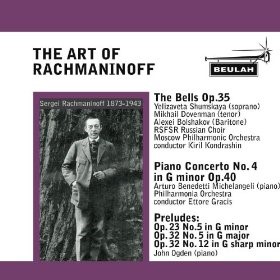 We
are already in Beulah’s debt for reissuing another Melodiya recording
of Rachmaninov, the Third Symphony (Svetlanov) and Symphonic Dances (Kondrashin) (1PD81); now they bring us Kondrashin’s Bells, equally well restored. If the source was the MK recording
which used to be available for the princely sum of 19/6 (£0.95)
the result is a miracle indeed, with nary a hint of the surface noise
which afflicted MK pressings even worse than Supraphon LPs, but not
at the expense of the sound which is luminous and clear by contrast
with anything that I could ever get out of MK LPs; there’s just
a hint of strain in loud passages. While some of the singing may strike
Western ears as unsubtle, this is a performance with an impact such
as I’ve never heard before. I’ve been somewhat ambivalent
about The Bells, but Kondrashin convinces me.
We
are already in Beulah’s debt for reissuing another Melodiya recording
of Rachmaninov, the Third Symphony (Svetlanov) and Symphonic Dances (Kondrashin) (1PD81); now they bring us Kondrashin’s Bells, equally well restored. If the source was the MK recording
which used to be available for the princely sum of 19/6 (£0.95)
the result is a miracle indeed, with nary a hint of the surface noise
which afflicted MK pressings even worse than Supraphon LPs, but not
at the expense of the sound which is luminous and clear by contrast
with anything that I could ever get out of MK LPs; there’s just
a hint of strain in loud passages. While some of the singing may strike
Western ears as unsubtle, this is a performance with an impact such
as I’ve never heard before. I’ve been somewhat ambivalent
about The Bells, but Kondrashin convinces me.
The virtues of Michelangeli’s performance of Piano Concerto No.4
are too well known to need rehearsing here. If you thought this the
orphan among Rachmaninov’s concertos, this should make you think
again. My only reservation is that you may well have one of the EMI
releases in which the coupling is the equally mandatory Ravel Piano
Concerto. The latest EMI Masters CD, 0852802, adds Haydn. See
Ian Lace’s 5-star review of earlier EMI reissue and Rob Barnett’s review of the Alto reissue of the Rachmaninov with Richter’s recording
of Piano Concerto No.2. The Beulah transfer sounds a trifle dry at first
but the ear soon adjusts.
If you go for this Beulah version of the Rachmaninov and find yourself
pining for the Ravel, without wishing to duplicate the Rachmaninov,
Michelangeli’s version of the Ravel is also available on an EMI
budget twofer alongside Munch’s Daphnis et Chloë Suite
2, Janet Baker’s Shéherézade, Karajan in Boléro and Alborada del Gracioso, Martinon’s Pavane, the
Melos Ensemble in Introduction and Allegro, Gavrilov’s Gaspard
de la Nuit and Plasson’s Ma Mère l’Oye and La Valse: 2376712 – review:
download from 7digital.com.
John Ogdon’s recording of three of the preludes makes a brief yet
enjoyable appendix on Beulah.
• Musicweb Classical Editor Rob Barnett has also
listened to this recording:
I am grateful to Brian Wilson for letting me hear Beulah’s latest
piece of recuperative advocacy for Rachmaninov and the exultantly unsophisticated
Melodiya sound of the 1960s. There had to be a follow-up to Beulah’s
similarly exalted Kondrashin Symphonic Dances and Third Symphony.
If you must have smoothly produced modern sound then this Kondrashin
conducted The Bells from the 1960s is not for you. There are
compensations for accepting Soviet analogue sound, a bit of pre-echo/print-through
before the massed choral entries and a modest degree of evidence of
50 year old LP provenance - you can hear the occasional scuff and rumble
- quite rare really. The plus points lie in this recording's overwhelmingly
neon-lit passion and its Russian fervour only just under steely control
from Kondrashin. This is a roaringly glorious account of The Bells which moves with rapidly acquired eruptive speed from hypnotically still
and tender to climactic paean. The singing has the whole-tone amplitude
familiar from Alexander Sveshnikov's RSFSR Choir LP of the same composer's Vespers (ASD2973); how about it Beulah - it’s a winner.
Of the three fine soloists the soprano is magnificently potent in riding
the orchestral furnace blast yet gentle too.
The LP from which this CD/download was made must surely have come from
the EMI-Melodiya ASD vinyl issue later included in their all-Soviet
Rachmaninov orchestral box SLS847. Given its age and our current obsession
with digital perfection this piece of Soviet rapture is not as well
known now as the more smoothly recorded Piano Concerto No. 4 (Michelangeli/Gracis).
The Michelangeli is a classic of the gramophone, much reissued - and
now not only by EMI. Alto reissued it on CD from LP sources quite recently. It shares the kinetic
excitability of the Kondrashin Bells. Last time I heard this sort of
thing was in the under-praised Nimbus version with John Lill and a natural
advocate of the wild-eyed Russian style, Takuo Yuasa. We end with three
of John Ogdon's Preludes. I had forgotten how good is his Op. 23 No.
5 - the epitome of romance havering unstably on the tipping point between
tears and impulsive action. Just one criticism of Beulah - the pianist's
name is John Ogdon not John Ogden. I fervently hope that Beulah will
reissue other treasures of the Soviet studios. There are three I would
single out:
1. EMI-Melodiya ASD2607 (exceptionally fine accounts of the
Scriabin and Arensky Piano Concertos)
2. the Casella-dedicated First Symphony of Georges Enescu with Rozhdestvensky
conducting an utterly possessed Moscow Radio Symphony Orchestra - Melodiya
C-523
3. Francesca da Rimini (Tchaikovsky) conducted by Vyacheslav Ovchinnikov
with the USSR Radio Symphony Orchestra heard on Olympia OCD139 (deleted).
Rough Soviet-style sound but the most breathtaking/gasping version I
have ever heard. Thanks to Nick Barnard for introducing me to this.
Strongly Recommended
 Gustav
HOLST (1874-1934) The Hymn of Jesus [22:55]
Gustav
HOLST (1874-1934) The Hymn of Jesus [22:55]
Frederick DELIUS (1862-1934) Sea Drift* [27:54]
Cynara [11:37]
Roderick Williams (baritone)*
Hallé Choir and Orchestra/Sir Mark Elder – rec. live (with
applause), 2012. DDD.
HALLÉ CDHLL7535 [62:28] – from eclassical.com (mp3)
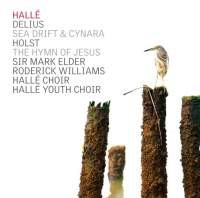 I
had to squeeze this in at the last minute, though I’d only listened
once when I closed this DL News and I had to jettison some Rautavaara
items till next time. The Hallé and Mark Elder go from strength
to strength, challenging strong existing versions in the Holst (Sir
Adrian Boult, Double Decca 4701912 or Decca Eloquence 4802327;
Richard Hickox, Chandos CHAN8901) and Sea Drift (Bryn
Terfel/Richard Hickox, Chandos CHAN9214).
I
had to squeeze this in at the last minute, though I’d only listened
once when I closed this DL News and I had to jettison some Rautavaara
items till next time. The Hallé and Mark Elder go from strength
to strength, challenging strong existing versions in the Holst (Sir
Adrian Boult, Double Decca 4701912 or Decca Eloquence 4802327;
Richard Hickox, Chandos CHAN8901) and Sea Drift (Bryn
Terfel/Richard Hickox, Chandos CHAN9214).
There are no texts from emusic.com and the bit-rate is not ideal –
202-226kb/s, so you may prefer to wait for classicsonline.com to offer
it at 320kb/s – but it’s a bargain from emusic.com at £1.68;
the recording sounds perfectly satisfactory and the more expensive amazon.com
download is not likely to come at a much higher rate. The low bit-rate
is probably not to blame for the slightly recessed choral sound.
Bela BARTÓK (1881-1945)
Violin Concerto No.1, BB48a, Sz36 [22:06]
Violin Concerto No.2, Sz112 [35:48]
Isabelle Faust (violin)
Swedish Radio Symphony Orchestra/Daniel Harding – rec. April 2012.
DDD
Pdf booklet included
HARMONIA MUNDI HMC902146 [57:54] – from emusic.com (mp3, 16– and 24-bit lossless)
 These
are not the most exciting performances of the Bartók concertos
that you will ever hear, but they are deeply considered and very satisfying.
Give them a little time to breathe – at first I thought the opening
of No.1 a little too delicate – and they come to life most convincingly.
These
are not the most exciting performances of the Bartók concertos
that you will ever hear, but they are deeply considered and very satisfying.
Give them a little time to breathe – at first I thought the opening
of No.1 a little too delicate – and they come to life most convincingly.
As usual, I downloaded and listened to the two extremes, mp3 and 24-bit
lossless and both are very good of their kind. The fairly short playing
time is reflected in the price ($10.42, mp3 and 16-bit /$15.63, 24-bit).
I recommended Arabella Steinbacher’s performances of these two
concertos with Marek Janowski (PentaTone) as my top choice, even in
preference to Kyung Wha Chung in December 2010 – review – and that, too, remains highly desirable if you prefer this music
with a bit more oomph. Download that, too, in mp3, 16– or 24-bit
lossless, with pdf booklet, from eclassical.com. ($10.98, mp3 and 16-bit/$20.12, 24-bit). The emusic.com version which
I reviewed back in 2010 is less expensive, at £2.10, but comes
at a lower bit-rate.
Alternatively, James Ehnes performs the two Violin Concertos and the
Viola Concerto on a well-filled Chandos CD (CHAN10690). That’s
another version which I place high on the list: see review – from theclassicalshop.net in mp3, 16– and 24-bit lossless with pdf booklet (£7.99/£9.99/£15.99).
We’re lucky to have so much choice.
Yehudi Menuhin fans will find his recordings of the violin and viola
concertante works of Bartók, plus the Duos and solo Violin Sonata
on an inexpensive 2-CD Gemini set – a notable bargain, which you
should find on disc for around £7.50, little more than the price
of downloading: review.
NB: Those who hanker after a more fiery version of Concerto No.2
may prefer Patricia Kopatchinskaja and Peter Eötvös on a Naive
recording which you will find review in the next DL News.
Karol SZYMANOWSKI (1882-1937)
Stabat Mater, Op. 53 (1925-1928) [23:25]
Harnasie, Op. 55 (1923-1931)* [34:59]
Lucy Crowe (soprano)
Pamela Helen Stephen (mezzo)
Gabor Bretz (baritone)
*Robert Murray (tenor)
BBC Symphony Chorus
BBC Symphony Orchestra/Edward Gardner
rec. 5-6 January 2013, Fairfield Halls, Croydon, UK
CHANDOS CHAN5123 [57:59] – from theclassicalshop.net (mp3, 16-bit lossless, 24/96 Studio stereo and surround)
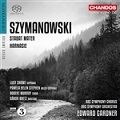 This
is the seventh and latest instalment in the Chandos Muzyka Polska series. At the helm is British-born Edward Gardner, recently appointed
principal guest conductor of the Bergen Philharmonic. Among his Lutoslawski
recordings is this fine collection; it was well received by Dominy Clements, who also welcomed
his first Szymanowski disc (review).
Up until now I’ve been following Antoni Wit’s Naxos cycle,
which has yielded memorable accounts of Symphonies 1 and 4 (review);
Valery Gergiev and the LSO have now entered the fray, although their
performances have polarised opinion.
This
is the seventh and latest instalment in the Chandos Muzyka Polska series. At the helm is British-born Edward Gardner, recently appointed
principal guest conductor of the Bergen Philharmonic. Among his Lutoslawski
recordings is this fine collection; it was well received by Dominy Clements, who also welcomed
his first Szymanowski disc (review).
Up until now I’ve been following Antoni Wit’s Naxos cycle,
which has yielded memorable accounts of Symphonies 1 and 4 (review);
Valery Gergiev and the LSO have now entered the fray, although their
performances have polarised opinion.
In six movements, the Stabat Mater is scored for a modest orchestra,
mixed chorus and three soloists. The hushed opening of ‘Mother,
bowed with grief appalling’ is as luminous as I’ve ever heard
it, and soprano Lucy Crowe’s aching lament is beautifully sung.
Austere – skeletal, even – this is Szymanowski distilled;
Gardner and his forces may seem a little distant – Gergiev is weightier
and more immediate – but in the chorus-dominated ‘Is there
any, tears withholding’ the Chandos sound blooms nicely. As for
the score’s folk-like elements they are clear but not too emphatic,
and mezzo Pamela Helen Stephen – soaringly secure – is radiant
in ‘Love’s sweet fountain, Mother dear’.
Goodness, what a quietly compelling performance this is, helped in no
small measure by Gardner’s subtly shaped and sensitively scaled
reading. The chorus is splendid too, ‘In thy keeping, watching,
weeping’ especially affecting. I like to think the acoustic of
the Fairfield Halls, Croydon – my ‘local’ – has
a part to play in this finely focused, most elegant recording. There
are no weak links here – baritone Gabor Bretz is rock steady in
the ecstatic ‘Maid immaculate, excelling’ – but really
it’s the two women who suffuse this performance with their pure,
filigreed singing.
I can’t imagine a more soul-searching account of the Stabat
Mater than this, or a more atmospheric, ‘hear through’
recording. Gergiev has the bolder sound, but he omits the organ and
his soloists are much more variable. In any event he doesn’t come
close to the spiritual core of this remarkable piece. That said, I find
the ultra-refined Chandos recording a little too recessed for my taste,
even if it does underline the restrained loveliness of the piece. I
often wonder if the balances in these stereo downloads are very different
from the surround mix, or the CDs/SACDs. I must try a comparison at
some point, if only to satisfy my curiosity. Anyone out there have a
view on this?
The ballet-pantomime Harnasie finds Szymanowski in forthright folk mode,
although the ‘Spring departure for the mountain pastures’
– marked Andante tranquillo – is a serene pastoral painted
in glowing colours. ‘Courtship’ is blessed with the same clarity
and nuanced delivery that so impresses in the Stabat Mater, but one
could argue that such a refined approach doesn’t work so well here.
Wit has more muscle and sinew, but then Gardner does bring a rare sparkle
and suavity to the robbers’ march and dance.
For all its felicities I really yearned for more vigour and volatility
in this performance – witness this intoxicating arrangement for four hands, two pianos – and I suspect
the unexaggerated, slightly cool recording doesn’t help. That said,
there are gains in that we are made much more aware of Szymanowski’s
telling use of colour and sonority. The chorus sings incisively in ‘Wedding’
and the discreet percussion in ‘Capping of the Bride’ is superbly
rendered. The singing in ‘Song of the Siuhaje’ has moments
of Orffian energy and the pulsing ‘Góral Dance’ is
colourful and crisp. Again I wished for added edge and excitement in
the raid, dance and abduction, but clearly that’s not Gardner’s
way.
So, a stand-out Stabat Mater, but for all its insights this Harnasie doesn’t displace the earthier, more robust Wit version. The beauty
of downloads is that one is able to ‘cherry-pick’ the best
bits; in this case I’d buy the Stabat Mater but I’d
give Harnasie a miss. There are very detailed liner-notes by
Adrian Thomas, and sung texts – in English and Polish – are
included.
A sublime opener; the rest is beautiful, but lacks essential drive and
passion.
Dan Morgan
http://twitter.com/mahlerei
Russian Masters 2
Sergei PROKOFIEV (1891-1953) Russian Overture, Op.72 [13:01]
Moscow Radio Symphony Orchestra/Alexander Gauk
Dmitri SHOSTAKOVICH (1906-1975) Symphony No.5 in d minor, Op.47
[44:32]
New York Stadium Symphony Orchestra/Leopold Stokowski – rec. 1959.
ADD.
Festival Overture, Op.96 [5:45]
Philharmonia Orchestra/Georges Prêtre
Alexander BORODIN (1833-1887) In the Steppes of Central Asia
[5:45]
Royal Philharmonic Orchestra/Georges Prêtre
BEULAH 3PD11 [69:02] – from iTunes, amazon.co.uk and amazon.com (mp3)
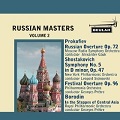 The
selling point here is Stoki’s recording of the Shostakovich symphony,
a work of which he conducted the first Western recording in 1939 (Music
and Arts MACD1232, with Nos. 6 and 7). Having been introduced
to the work by Karel Ančerl (Supraphon and briefly Music for Pleasure)
and André Previn – RCA, still my preferred version, I was
surprised to find this version at first sounding a little under-powered
– is it that music that once sounded ‘difficult’ and
earth-shattering has become so much part of the repertoire or is it
maybe that the recording, though a very good transfer, has less impact
than the Prokofiev which precedes it? In any event, by ten minutes into
the first movement there’s all the power and drama that you could
want and that’s true of the finale, too.
The
selling point here is Stoki’s recording of the Shostakovich symphony,
a work of which he conducted the first Western recording in 1939 (Music
and Arts MACD1232, with Nos. 6 and 7). Having been introduced
to the work by Karel Ančerl (Supraphon and briefly Music for Pleasure)
and André Previn – RCA, still my preferred version, I was
surprised to find this version at first sounding a little under-powered
– is it that music that once sounded ‘difficult’ and
earth-shattering has become so much part of the repertoire or is it
maybe that the recording, though a very good transfer, has less impact
than the Prokofiev which precedes it? In any event, by ten minutes into
the first movement there’s all the power and drama that you could
want and that’s true of the finale, too.
Though billed as the New York Phil, I take this to be the 1959 Everest
recording with the Stadium Orchestra, which briefly appeared in the
UK as a World Record Club LP and re-surfaced, again briefly, as SDBR3010.
It wouldn’t be my first choice – it’s not just the recording
that makes the strings sound rather thin – but the maestro’s
many fans will wish to have it. Again I find myself in the good company
of Edward Greenfield who, I find, said much the same in 1969.
You wouldn’t buy this for the fillers but you wouldn’t be
disappointed if you did. The Prokofiev was originally the filler for
Kondrashin’s recording of the Sixth Symphony. The dashing account
of the Festival Overture came with Prêtre’s recording
of Symphony No.12 and the much quieter Borodin was part of a concert
of Russian music.
Paul HINDEMITH (1895-1963)
Concert Music for Strings and Brass, Op.50 [16:20]
Concerto for Violin and Orchestra* [27:29]
Symphonic Metamorphoses on Themes of Carl Maria von Weber [19:35]
Leonidas Kavakos violin*
BBC Philharmonic/Yan Pascal Tortelier – rec.2000. DDD
CHANDOS CHAN9903 [63:32] – from theclassicalshop.net (mp3 and lossless)
[‘The triumph of this particular disc is the Violin Concerto, which
is performed with tremendous panache’. See review by Christopher Thomas.]
Concerto for Violin and Orchestra (1939)* [27:15]
Sonata for Solo Violin, Op.31/2 (1924) [9:05]
Sonata in E flat for Violin and Piano, Op.11/1 (1918)** [8:40]
Sonata in E for Violin and Piano (1935)** [9:10]
Frank Peter Zimmermann (violin)
Frankfurt Radio Symphony Orchestra/Paavo Järvi* – rec. 2009.
DDD/DSD
Enrico Pace (piano)** – rec.2012. DDD/DSD
Pdf booklet included
BIS-SACD-2014 [68:11] – from eclassical.com (mp3, 16– and 24-bit lossless)
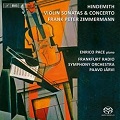
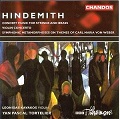 With
this recording of the Violin Concerto BIS now have most of the major
orchestral works of Hindemith under their belt. Dan Morgan and I were
both somewhat disappointed with their earlier recording of the Mathis
der Maler Symphony, Nobilissima Visione and the Symphonic
Metamorphoses from Sao Paolo – review – but the new recording is cut from better cloth.
With
this recording of the Violin Concerto BIS now have most of the major
orchestral works of Hindemith under their belt. Dan Morgan and I were
both somewhat disappointed with their earlier recording of the Mathis
der Maler Symphony, Nobilissima Visione and the Symphonic
Metamorphoses from Sao Paolo – review – but the new recording is cut from better cloth.
I’ve taken so long to evaluate my response to the new BIS and to
compare it with the Chandos and David Oistrakh/Paul Hindemith (Decca E4702582 or 4767288, both 2-CD sets, the latter download
only) – still my benchmark – that other reviews have overtaken
me and made it their equivalent of Recording of the Month. I need only
add that the performance of the concerto rivals that earlier Decca version
and that the high-quality recording (especially in 24-bit form, but
impressive even as mp3) and the coupling are additional recommendations.
The Chandos recording is still well worth considering if you prefer
the orchestral couplings there to the chamber works on BIS or have the
ECM recordings of these; otherwise I’d go now for the BIS.
Dmitri SHOSTAKOVICH (1906-1975)
Film Music – Vol. 1
Fragments from the music to the ‘Maxim’ trilogy, Op. 50a (arr.
Lev Atovmyan)
(1935-1939) [27:15]
Music from ‘The Man with a Gun’, Op. 53 (1938) [8:22]
Music from ‘A Girl Alone’, Op. 26 (1931) [21:02]
Music from ‘King Lear’, Op. 137 (1970) [18:18]
Sheffield Philharmonic Chorus
BBC Philharmonic/Vassily Sinaisky
rec. 2002, Studio 7, New Broadcasting House, Manchester, UK
pdf booklet included
CHANDOS CHAN10023 [73:34] – from theclassicalshop.net (mp3, 16-bit lossless)
Film Music – Vol. 2
Suite from ‘The Golden Mountains’, Op. 30 – Incidental
music to the film by Sergei Yutkevich (1931) [14:24]
Suite from ‘The Gadfly’, Op. 97 – Incidental music to
the film by Alexander
Faintsimmer (1955) [42:20]
‘Volochayev Days’, Op. 48 – Incidental music to the film
by the Vasiliev brothers (1936-1937) [9:16]
BBC Philharmonic/Vassily Sinaisky
rec. 2003, Studio 7, New Broadcasting House, Manchester, UK
pdf booklet included
CHANDOS CHAN10183 [65:50] – from theclassicalsshop.net (mp3, 16-bit lossless)

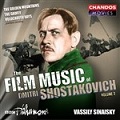 Vassily
Sinaisky, the BBC Phil’s principal conductor from 1996 to 2012,
has recorded some fine Russian discs for Chandos. Chief among them are
these two volumes of Shostakovich’s film music. Frank Strobel (Hänssler),
Michail Jurowski (Capriccio) and Mark Fitz-Gerald (Naxos) have also
added to the growing list of recordings in this genre. Listeners who
dismiss and deride film music – a surprising number, alas –
should make an exception here; these scores are well worth exploring,
even if most are just fragments and arrangements.
Vassily
Sinaisky, the BBC Phil’s principal conductor from 1996 to 2012,
has recorded some fine Russian discs for Chandos. Chief among them are
these two volumes of Shostakovich’s film music. Frank Strobel (Hänssler),
Michail Jurowski (Capriccio) and Mark Fitz-Gerald (Naxos) have also
added to the growing list of recordings in this genre. Listeners who
dismiss and deride film music – a surprising number, alas –
should make an exception here; these scores are well worth exploring,
even if most are just fragments and arrangements.
The first CD kicks off with excerpts from the ‘Maxim’ trilogy
– The Youth of Maxim (1935), The Return of Maxim (1937)
and The Vyborg Side (1939). Although made by the Eccentrics Grigori
Kozintsev and Leonid Trauberg these films – the tale of a worker’s
rise to head of the national bank – seem pretty conventional. The
music, though, has Shostakovich’s fingerprints all over it, from
‘Courage, my friends’ – the Sheffield Philharmonic Choir
are wonderfully fervent here – and the dark, cello-led lament for
the death of an old worker to the infectious little waltz and the hurly-burly
of ‘Struggle at the barricades’. Sinaisky and his players
revel in these tunes, big and small, and the recording – made at
the much-missed New Broadcasting House, Manchester – is exceptionally
vivid and weighty.
As John Riley points out in his excellent liner-notes The Man with
a Gun (1938) is an early example of kinoleniniana, or films
that idolised Lenin. Given the permafrost that took hold of Soviet arts
in the 1930s this is a safe soldierly tale made more interesting by
a varied and incisive score. Remarkably one never gets the sense that
Shostakovich is ‘slumming it’ with these often bitty tunes,
which emerge with tremendous verve and vitality. The Finale, with its
heraldic brass and thumping bass drum, is especially thrilling.
The 1931 silent Odna (A Girl Alone) tells the story of Yelena
Kuzmina, a young teacher from Leningrad who is posted to the Altai Mountains
where she’s ostracised by the parents and left to die in the cold.
Saved by the children she’s taken back to Moscow by plane at the
end of the last reel. Poignant and bizarre by turns, Odna is blessed
with finely crafted, piquant music that’s best appreciated in its
entirety; which is why I must recommend Mark Fitz-Gerald’s complete
recording for Naxos. That said, Sinaisky and his orchestra are never
less than satisfying, even if one only gets glimpses of this oft-startling
score.
This initial volume rounds off with Shostakovich’s austere, borderline
frigid score for Kozintsev’s King Lear (1970). As Riley
puts it, the film’s parallels with Brezhnev’s ‘rudderless
state’ are unmistakable; indeed, it’s difficult to imagine
such pointed and pithy Soviet film music being penned even a few years
earlier. ‘The Voice of Truth’ has seldom sounded so glacial,
its title as darkly ironic as it was possible to be in a society where
the real Pravda was in short supply. Sinaisky draws superb playing from
the BBC Phil, who are as much at home with these gaunt outlines as they
are with the broad brush strokes of the earlier scores. How enigmatically
it all ends, the Fool – licensed to articulate seditious thoughts
– finally silenced.
Volume 2 returns to a Revolutionary theme with The Golden Mountains,
centred on the 1905 steelworkers’ uprising that preceded the infamous
massacre that took place later that year. It’s a mixture of bold
statements and delightful asides, the Hawaiian guitar in the Waltz a
good example of the latter. Not one of the composer’s most memorable
scores perhaps, but worth hearing nonetheless. As before the recording
is big and bold, with the slightly soft edges one remembers from Chandos
releases of old.
The Gadfly (1955) continues the Revolutionary theme, although
this time it’s focused on the unification of Italy. The suite has
fared well on record, but Sinaisky makes it seem much more symphonic
than usual; the Contradance is delicate, the Folk Dance blends passion
with polish, and the Interlude is both attractive and unsettling. The
Barrel Organ Waltz is delightfully done, and Sinaisky makes the most
of the score’s colouristic touches. Rhythmically he’s just
as astute – the Galop, so crisply played, retains a certain charm
– and the harp-led Andantino emerges as one of Dmitri’s loveliest
miniatures. The Romance and Intermezzo are limpid but not limp, and
Peter Dixon’s cello playing in the gentle Nocturne is just gorgeous.
The Gadfly is full of good things, and I doubt you’ll hear
this music more lovingly presented or more atmospherically recorded
than it is here. This splendid series ends with Volochayev Days (1937), a rather crude piece of propaganda based on the Japanese attack
on Vladivostok in 1918. A bright little overture and a concluding fragment
sandwich a fairly restrained piece of ‘battle music’, whose
mood is more light-hearted than one might expect. Interesting, but eminently
forgettable.
It would be idle to pretend Shostakovich wrote anything like his best
music for the movies, but there’s enough of quality and interest
here to warrant investigation. Kudos to Chandos and Sinaisky for treating
these scores with the care and attention they deserve. John Riley’s
fascinating liner-notes complete a fine package.
Plenty to enjoy here; a must for DSCH fans and completists alike.
Dan Morgan
http://twitter.com/mahlerei
As usual, when Dan reports on the lossless version, I tried the mp3
and that sounds pretty well, too – if you’re happy with best-quality
mp3, it’s safe to save the £2.00 difference.
I also listened to the equally compelling Volume 3, this time in both
24-bit lossless and mp3:
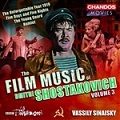 Suite
from ‘Hamlet’ [28:47]
Suite
from ‘Hamlet’ [28:47]
From ‘The Unforgettable Year 1919’* [7:29]
Suite from ‘Five Days and Five Nights’ [32:59]
Suite from ‘The Young Guard’ [10:05]
Martin Roscoe (piano)*
BBC Philharmonic/Vassily Sinaisky – rec. October 2004. DDD
Pdf booklet included
CHANDOS CHAN10361 [79:47] – from theclassicalshop.net (mp3, 16– and 24-bit lossless)
Other fine Chandos recordings of Shostakovich include:
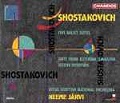 Ballet
Suite No.1 (1949)* [13:34]
Ballet
Suite No.1 (1949)* [13:34]
Ballet Suite No.2 (1951)* [19:37]
Ballet Suite No.3 (1952)* [15:46]
Festive Overture Op.96 (1947) [5:52]
Ballet Suite No.4 (1953)* [12:49]
Ballet Suite No.5 from The Bolt, Op.27a (1931) [29:17]
Suite from Katerina Ismailova (Lady Macbeth of the Mtsensk District)
(1943/1962) [16:59]
Royal Scottish National Orchestra/Neeme Jarvi – rec. 1987/88. DDD
* Edited by Lev Atovmyan
No booklet, but that for alternative release on CHAN10088 (below) can
be downloaded
CHANDOS ENCHANT CHAN7000 [2 CDs: 113:01] – from theclassicalshop.net
(mp3 and lossless)
[NB: Beware – also available at a higher price as CHAN10088, mp3
only]
Basic repertoire: Benjamin BRITTEN (1913-1976) War Requiem
Who could have though fifty years ago that the War Requiem would come
to be so well represented in the catalogue? Currently available and
recommendable, not necessarily in order:

•Decca Originals 4757511 (2 CDs) – Britten’s own
recording – review and download
review – recently also reissued at a slightly higher price
on two CDs and a blu-ray audio disc (4785433) and available without
the rehearsal excerpts on mp3, 16– and 24-bit lossless from linnrecords.com (UNI177). In one format or another this still holds its own against
all comers.
• Arthaus 108070 (blu-ray) or 101659 (DVD) –
the 50th-anniversary recording in Coventry Cathedral directed by Andris
Nelsons. Recording of the Month – review.
• Chandos CHAN8983-4 (CD - download from theclassicalshop.net,
mp3 and lossless, or stream from Naxos Music Library, both with pdf
booklet) or CHSA5007 (SACD). This version conducted by Richard
Hickox also contains Sinfonia da Requiem and Ballad of Heroes. NB: good value, but presumably due for reissue in the near future
in the less expensive Chandos Hickox edition.
• BBC Legends BBCL4062: a live recording, complete on one
CD, conducted by Carlo Maria Giulini, with Britten himself in charge
of the smaller ensemble. Download from eclassical.com (mp3 and lossless) or stream from Naxos Music Library, both with pdf
booklet
• EMI 5059092: a 2-CD set with Simon Rattle conducting the War Requiem and Charles Groves Bliss’s Morning Heroes;
also Rattle conducts Britten, EMI 2427432 (5 CDs). Both
these are at budget price.
• LPO LPO0010: conducted by Kurt Masur – from classicsonline.com with pdf booklet. NB: better value on disc at around £10
(2 CDs) or £12 (one non-hybrid SACD). Stream from Naxos Music
Library.
• Hänssler Classic 98.507: (2 SACDs) conducted by Helmuth
Rilling – review.
Rather poor value with no fillers on two CDs for around £23, but
the 7music.com download comes at the full 320kb/s and costs just £7.99 –
others charge twice that amount.
Andrzej PANUFNIK (1914-1991)
Symphonic Works – Volume 1
Uwertura tragiczna (Tragic Overture) [7:47]
Nocturne [17:27]
Uwertura bohaterska (Heroic Overture) [5:37]
Katyn Epitaph [7:37]
A Procession for Peace [7:44]
Harmony [15:01]
Polish Radio Symphony Orchestra/Łukasz Borowicz
CPO 7774972 [61:13] – from classicsonline.com (mp3) or stream from Naxos Music Library
Symphonic Works – Volume 6
Concertino for Timpani, Percussion and Strings (1979/80) [15:41]
Symphony No. 9, Sinfonia della speranza (1986) [42:33]
Konzerthausorchester Berlin/Łukasz Borowicz
CPO 7776852 [58:14] – from eclassical.com (mp3 and lossless, no booklet) or stream from Naxos
Music Library (with booklet)
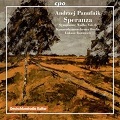 ‘The Sinfonia di Speranza reflects my musical interpretation of the
ideal of hope: within its notes I have tried to incorporate a spiritual
message, an expression of my faith in mankind as well as my longing
for racial and religious tolerance among all people’.
‘The Sinfonia di Speranza reflects my musical interpretation of the
ideal of hope: within its notes I have tried to incorporate a spiritual
message, an expression of my faith in mankind as well as my longing
for racial and religious tolerance among all people’.
Panufnik fans will want both of these recordings and the others listed
below. Other readers should perhaps first dip into one or more of these
recordings via the Naxos Music Library – a most valuable tool for
checking before buying.
Eclassical.com also have mp3 and lossless downloads of Volumes 4 (7776832)
and 5 (7776842).
For details see reviews by Rob Barnett (Volume
4; Volume
5) and Michael Cookson (Volume
5). As with Volume 6, it’s a shame that the booklet is not
offered as part of the deal, as it is by classicsonline.com, though
their versions come in mp3 only for the moment – they are adding
more and more lossless flac downloads. If you have access to the invaluable
Naxos Music Library, the booklets can be downloaded from there. Volume
3 is available from classicsonline.com or for streaming from Naxos Music
Library.
For my review of Symphony No.5 (Sinfonia di Sfere) on Ondine ODE1101-5, well worth having though it involves duplicating Symphony
No.3 from CPO, please see August
2010 DL Roundup. The passionato.com link no longer applies and there’s
no substitute in lossless sound, but classicsonline.com have it in full-strength mp3, with booklet (or stream from Naxos Music
Library). (NB: Sinfonia di Sfere is No.5, not No.6 – a typo
has crept into that 2010 review.)
Panufnik’s Cello Concerto, performed by its dedicatee Rostropovich,
is available as a single from NMC (D010S – see November
2011/2 DL Roundup).
Malcolm ARNOLD (1921-2006) The Return of Odysseus, Op.119* (1976,
premiere recording) [28:20]
Darius MILHAUD (1892-1974) Suite Française, Op.
248b (1944) [15:57]
(Normandie [1:46]; Bretagne [3:42]; Île de France [2:07]; Alsace-Lorraine [5:10]; Provence [3:12])
Ralph VAUGHAN WILLIAMS (1872-1958) Toward the Unknown Region
(1907) [13:17]
Anne Taylor (soprano); The City of Glasgow Chorus
Orchestra of Scottish Opera/Graham Taylor – rec. October 2005.
DDD
Pdf booklet included
DIVINE ART DDA25035 [57:54] – from theclassicalshop.net (mp3 and lossless) or stream from Naxos Music Library
[see review by Rob Barnett – ‘An essential purchase for Arnold enthusiasts
who will be richly rewarded by The Return of Odysseus. Milhaud
fans will want this orchestral version of the suite. RVW’s following
will be pleased to hear a more sensual version of Toward the Unknown
Region’ – and review by Paul Serotsky]
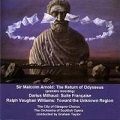 A
hugely enjoyable rip-roaring performance of a most interesting Malcolm
Arnold byway for those who already know the comparatively well-travelled
highways of his orchestral music. Chandos and Naxos have served us very
well there but Divine Art offer the icing on the cake. Inevitably Arnold
brings a lighter touch to a serious subject – if you want serious
go for Monteverdi’s Il Ritorno d’Ulisse in Patria. The couplings are equally valuable, though the VW is less rare than
the other works. The recording sounds well, especially in lossless form;
I didn’t listen on headphones, so didn’t experience Paul Serotsky’s
problem with lack of front-to-back perspective. Not a new release but
theclassicalshop.net have only just issued it in download form; better
late than never.
A
hugely enjoyable rip-roaring performance of a most interesting Malcolm
Arnold byway for those who already know the comparatively well-travelled
highways of his orchestral music. Chandos and Naxos have served us very
well there but Divine Art offer the icing on the cake. Inevitably Arnold
brings a lighter touch to a serious subject – if you want serious
go for Monteverdi’s Il Ritorno d’Ulisse in Patria. The couplings are equally valuable, though the VW is less rare than
the other works. The recording sounds well, especially in lossless form;
I didn’t listen on headphones, so didn’t experience Paul Serotsky’s
problem with lack of front-to-back perspective. Not a new release but
theclassicalshop.net have only just issued it in download form; better
late than never.
Bargain of the Month
 John
LANCHBERY (1923-2003)
John
LANCHBERY (1923-2003)
The Tales of Beatrix Potter (soundtrack from the Royal ballet film)
Royal Opera House Covent Garden Orchestra/John Lanchbery
EMI CLASSICS FOR PLEASURE [51:49] – from sainsburysentertainment.co.uk (mp3) or stream from Naxos Music Library
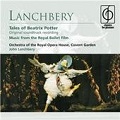 A
wonderful bargain at £2.99: tuneful music, splendidly realised
with the composer/arranger at the helm, very well recorded and presented
in top-quality (320kb/s) mp3 – just a trifle over-bright, reflecting
the soundtrack origin. UK purchasers with a Nectar card even get four
bonus points. Only the lack of notes indicating which music was raided
for the ballet – mostly Victorian music hall and Sullivan –
detracts slightly.
A
wonderful bargain at £2.99: tuneful music, splendidly realised
with the composer/arranger at the helm, very well recorded and presented
in top-quality (320kb/s) mp3 – just a trifle over-bright, reflecting
the soundtrack origin. UK purchasers with a Nectar card even get four
bonus points. Only the lack of notes indicating which music was raided
for the ballet – mostly Victorian music hall and Sullivan –
detracts slightly.
If you don’t already have Lanchbery’s equally (even more?)
colourful arrangement of La Fille mal gardée, the two
can be obtained together on a recent EMI twofer (now Warner Classics
Parlophone) – £4.99 from classicsononline.com (mp3).
Brooklyn Rider: A Walking Fire
LJOVA (Lev ZHURBIN) (b.1978) Culai (2011-2012) [18:19]
Béla BARTÓK (1881-1945) String Quartet No. 2 Sz.67
(1915-1917) [27:10]
Colin JACOBSEN (b.1978) Three Miniatures for String Quartet (2011):
Majnun’s Moonshine [3:42]
The Flowers of Esfahan [7:21]
A Walking Fire [5:39]
Brooklyn Rider (Johnny Gandelsman, Colin Jacobsen (violin), Nicholas
Cords (viola), Eric Jacobsen (cello))
DECCA/MERCURYCLASSICS 4810278 [61:55] – from amazon.co.uk (mp3, with pdf booklet)
 This
album takes its name from the final work, the third of Jacobsen’s Three Miniatures, so that nowhere on the cover would you know
that it contains at its heart a fine performance of Bartók’s
Second String Quartet. I think that a shame, since it deprives it of
a potentially greater audience.
This
album takes its name from the final work, the third of Jacobsen’s Three Miniatures, so that nowhere on the cover would you know
that it contains at its heart a fine performance of Bartók’s
Second String Quartet. I think that a shame, since it deprives it of
a potentially greater audience.
The programme begins with a recent work influenced by the gypsy fiddler
known as ‘Culai’, reminiscent of Enescu’s Romanian
Rhapsody, yet clearly modern without sounding too spikey, and closes
with three pieces by a member of the quartet, Colin Jacobsen, none of
which should prove too difficult for those who buy the recording primarily
for the Bartók – indeed, that work, in this strong performance,
is in many ways the toughest ask here.
Well worth considering, then, if the programme appeals … but how
many prospective purchasers will be content with just the one Bartók
quartet? Listen to the second and you’ll be needing its five companions,
preferably from the Takács Quartet on Mercury’s sister label,
Decca (4552972*) or the Belcea Quartet (EMI 394002 –
from sainsburysentertainment.co.uk, mp3, or stream from Naxos Music Library).
Those in search of a bargain should consider the Tokyo String Quartet,
recently reissued on Decca Eloquence (4807120) or the Keller
Quartet on Warner Apex – review.
* download only – mp3 from 7digital.com,
mp3 and lossless from prestoclassical.co.uk – surely due for reissue on CD?
David Barker’s Reviews
With Chandos having a summer break, releasing only Richard Hickox re-issues
in June and July, I thought I would trawl their back catalogue for recordings
I missed first time round.
Kurt SCHWERTSIK (b.1935)
Nachtmusiken
Herr K. Entdeckt Amerika
Baumgesänge
BBC Philharmonic/H K Gruber – rec. 2010. Pdf booklet available
CHANDOS CHAN10687 [59:52] Download from theclassicalshop.net (mp3 16– and 24-bit lossless)
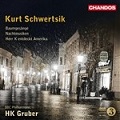 I
have to admit to judging a book by its cover when this was first released
in 2011, leaping to the conclusion that this was avant-garde because
of the conductor, HK Gruber, whose music I had sampled and found not
to my taste. As it turns out, Schwertsik and Gruber are close friends,
and the music is well-written and accessible, a point made by my colleagues,
Nick Barnard and Byzantion, when I took the trouble to actually read
their reviews. Lest you think that it is simple and undemanding fare,
please think again – it is complex, without being complicated.
I
have to admit to judging a book by its cover when this was first released
in 2011, leaping to the conclusion that this was avant-garde because
of the conductor, HK Gruber, whose music I had sampled and found not
to my taste. As it turns out, Schwertsik and Gruber are close friends,
and the music is well-written and accessible, a point made by my colleagues,
Nick Barnard and Byzantion, when I took the trouble to actually read
their reviews. Lest you think that it is simple and undemanding fare,
please think again – it is complex, without being complicated.
Nachtmusiken is a film score in search of a film, and very much
an exercise in spot the "influence". The first movement "Janáček
appeared to me in a dream" gives the game away rather easily, but
it doesn’t take much to find Shostakovich in the fourth movement
march and Mahler in the finale.
The title of Herr K. Entdeckt Amerika comes from an unfinished
Kafka novel, but the musical connections to the four named movements
is rather tenuous. This work, later expanded into a full-scale ballet,
grabbed me rather less than its disc-mates, but at under 15 minutes,
it doesn’t outstay its welcome and certainly has its interesting
moments.
Baumgesänge (Tree songs) is the earliest work on the disc,
dating from 1992, and despite the title, purely orchestral. Had the
work lacked its programmatic title, I certainly wouldn’t have made
any connections to trees, but I would not have enjoyed it any less.
It is, by turns, dramatic, swooning, ironic and joyous, and a work that
deserves to be heard.
Ernest BLOCH (1880-1959)
Sacred service
Louis Berkman (baritone)
The Zemel Choir – London Symphony Orchestra/Geoffrey Simon
rec. 1978
CHANDOS CHAN8418 (re-issued as CHAN10288) [51:00] Download
from theclassicalshop.net: CHAN8418 (mp3 and lossless) ~~ CHAN10288 (mp3 only, budget price)
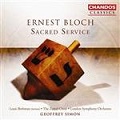 The
original release of this dates back to the LP era. Perhaps, this explains
a different quality to the sound: not as vivid as more recent Chandos
recordings, but compensated for by the warmth. Am I imagining that this
is how LPs used to sound?
The
original release of this dates back to the LP era. Perhaps, this explains
a different quality to the sound: not as vivid as more recent Chandos
recordings, but compensated for by the warmth. Am I imagining that this
is how LPs used to sound?
The work itself is dramatic and moving, reminding me very much of Vaughan
Williams in Dona nobis pacem. The Zemel Choir does particularly
fine work, as one would expect from a Jewish group in this repertoire.
The re-issue is only available in mp3 format, while the original is
in both lossless and mp3. Oddly, the two identical (I presume) mp3 versions
are priced very differently – original £7.99, re-issue £4.99
– go figure.
Ola GJEILO (b. 1978)
Northern Lights
Ola Gjeilo (piano) Harrington String Quartet; Alison Chaney (soprano);
Ted Belledin (tenor saxophone)
Phoenix Chorale/Charles Bruffy – rec. 2011
Pdf booklet available
CHANDOS CHSA5100 [59:43] Download from theclassicalshop.net (mp3, 16– and 24-bit lossless)
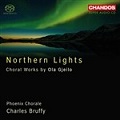 A
collection of gentle choral works, some accompanied by various groupings
as you can see from the performer list. They are in the Karl Jenkins/Howard
Shore mould, and hence, do not present an intellectual challenge. They
are, however, beautifully performed, and very soothing after a difficult
day.
A
collection of gentle choral works, some accompanied by various groupings
as you can see from the performer list. They are in the Karl Jenkins/Howard
Shore mould, and hence, do not present an intellectual challenge. They
are, however, beautifully performed, and very soothing after a difficult
day.
My colleagues, Brian Wilson and Karim Elmahmoudi, each found much to
like, particularly Brian who made it his Discovery of the Month.
John Quinn, while acknowledging the quality of some of the works, didn’t
particularly enjoy the accompanied pieces, finding them quite unoriginal.
I can understand his reservations, but the music clearly suited my mood,
and I did enjoy the variety in the instrumentation.
If you want a balm rather than a purge, this might well be the medicine
for you.
Carl Maria von WEBER (1786-1826)
Invitation to the dance
Symphonies 1 & 2
Bassoon concerto
Karen Geoghegan (bassoon)
BBC Philharmonic/Juanjo Mena– rec. 2012
Pdf booklet available
CHANDOS CHAN10748 [74:46] Download from theclassicalshop.net (mp3, 16– and 24-bit lossless)
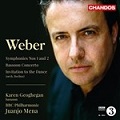 Somehow
Weber’s music had evaded my attention, perhaps because his best
known works are in the areas of opera and wind instruments, neither
among my favourites. That being the case, I was quite unprepared for
the quality of this music.
Somehow
Weber’s music had evaded my attention, perhaps because his best
known works are in the areas of opera and wind instruments, neither
among my favourites. That being the case, I was quite unprepared for
the quality of this music.
Invitation to the dance is a Berlioz orchestration of a Weber
piano work, and is a ravishing combination of the former’s skills
with orchestral colours and the latter’s talents for melody.
The two symphonies date from the first decade of the nineteenth century,
and as such, are in the shadow of Beethoven’s Eroica, Fifth
and Pastoral. If you attempt to make this comparison, then Weber
comes out much worse for wear, but then again, who doesn’t? Better
to see them as a bridge between Haydn and Schubert.
I’m afraid that I feel that the bassoon is one of those instruments
that should heard but not seen, by which I mean that it adds interest
in the background in an orchestral work, but its place isn’t at
the front in the spotlight. Even Mozart can’t convince me otherwise,
and for all the fine playing of Karen Geoghegan and the sweet melodies
in this concerto, it is still the bassoon. If you don’t have this
aversion, I’m sure you will enjoy it greatly.
Miklós RÓZSA (1907-1995)
Overture to a Symphony Concert
Three Hungarian Sketches
Tripartita
Hungarian Serenade
BBC Philharmonic/Rumon Gamba – rec. 2008
Pdf booklet available
CHANDOS CHAN10488 [74:46] Download from theclassicalshop.net (mp3, 16– and 24-bit lossless)
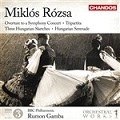 Rob
Barnett welcomed this first volume of the orchestral works of the famous
Hungarian film score composer back in 2009 – review;
also October
2011/1 Roundup. Progress in the series has been rather slow since
then, there being only two more releases. Given the quality of this
one, it is to be hoped that more are to come soon.
Rob
Barnett welcomed this first volume of the orchestral works of the famous
Hungarian film score composer back in 2009 – review;
also October
2011/1 Roundup. Progress in the series has been rather slow since
then, there being only two more releases. Given the quality of this
one, it is to be hoped that more are to come soon.
The Hungarian-titled works are the highlights. Not surprisingly, given
their titles, they are on the lighter end of the spectrum, but only
in the best sense. The Serenade is so redolent of Vaughan Williams,
that I feel Rózsa must have had been to a performance of the London Symphony before he wrote this. It is a delightful work,
beginning with a light-hearted march which I can only describe as rustic,
the inner movements rapturously melodic, and the final dance, raucous
and folk-inflected. The second of the Sketches is a small-scale
masterpiece.
The other works are more showy: the overture would be a perfect orchestra
and audience warm-up – though I wager it never is – while
the martial Tripartita brings to mind Shostakovich’s Symphony
11.
I will certainly be listening to volumes 2 and 3, which feature the
violin and cello concertos, soon.



 All Nimbus reviews
All Nimbus reviews








